#also the way there is no true hell so therefore there is nothing to be afraid of when you die
Explore tagged Tumblr posts
Text
something i think is really interesting about judaism is that there are movements that simply. do not believe that the torah (the main book of judaism) was written by god. i mean in what other religion would this be widely adopted. why hasn’t similar ideas spread further? what makes judaism different from them? while orthodox claim that jews who believe this are heretical, they are still forced to engage with these arguments that the torah was simply written by people trying to make sense of the world. there are also multiple movements within orthodoxy that force them to engage with this argument as well— like the fact that there are orthodox individuals who believe in science and evolution. if the torah is wrong about adam and eve, what else could it be wrong about? it’s so just so interesting to me.
#jumblr#jewish#twinkling.talks#obviously this isn’t everyone’s experience#but i think judaism has been able to weather all these massive movements because it is a religion all about questioning itself#and arguing. thinking about how#the rabbis were arguing about something and god was showing them signs n they were like U DONT GET A SAY IN THIS. lol#also the way there is no true hell so therefore there is nothing to be afraid of when you die#u get out in the washing machine or u can be reborn :) who knows we do not care#i also rly enjoy that the way you make sure people are remembered is by always saying their name#n if u want that person to actually suffer u say let his name be destroyed!#i just deeply enjoy being jewish n feel very lucky to have grown up with it
23 notes
·
View notes
Text
The "Hornsent deserved it" sentiments make me lose my goddamn mind
Short answer: No they didn't.
Long answer: Oh my gooooooooooood can we NOT do this shit, please???
There are two underlying sentiments to this line of thinking.
The Hornsent hurt Marika's people, thus Marika did nothing wrong, therefore they deserved to die badly
The Hornsent hurt Marika's people + Midra and some others, Marika is still evil, but the Hornsent deserved to be destroyed
Both may even come to the extreme of "Messmer wasn't cruel enough" or some other nonsense in the same vein.
-
Number 1
To tackle number one, we need to remember a little thing called Elden Ring's base game. The Hornsent's jar ritual is undoubtedly abhorrent, that much is true. But I urge you to remember the things that happened during Marika's reign. She:
Murdered all of the Fire Giants but one, subjecting him to a fate similar to hers but worse, forced into labor confined on the mountain among the remains of his people and culture. She mocked him, to boot. All of this because they might have burnt the Erdtree.

Enslaved the Misbegotten from birth "or worse" because their species just so happened to have made contact with the Crucible.
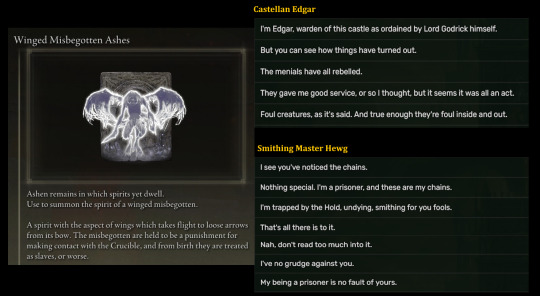
Rewarded her own loyal Crucible Knights with scorn because of it too, as they didn't fit her current society that they fought to establish.
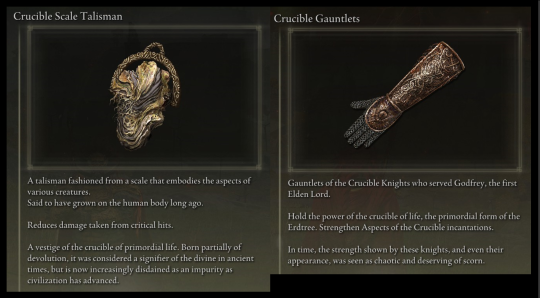
Made sure the Albinaurics were seen as lesser just because they were graceless, which influenced the way they were treated. She even had her Inquisition, run by Rykard, torture them in needlessly cruel manners, as they appear to be their main victims.
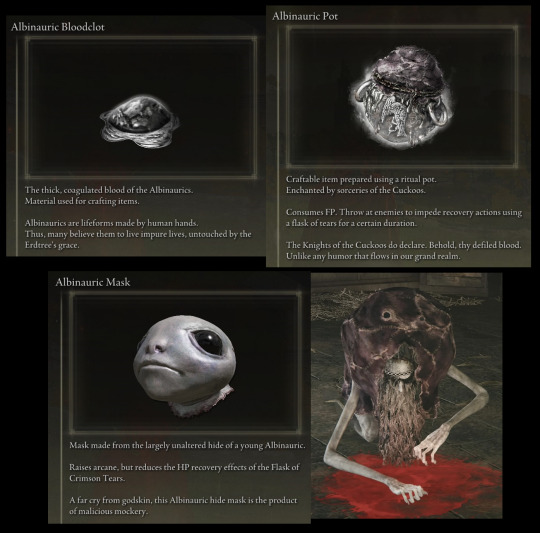
Just in general, she allowed Rykard to run a sadistic Inquisition to torture heretics to the Golden Order in the first place, and she saw nothing wrong with it or their practices.
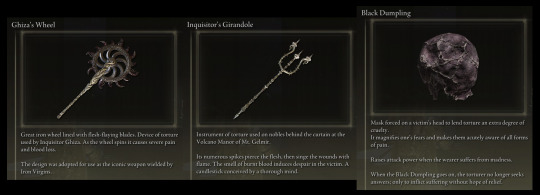
She entombed the entire Great Caravan over a false rumor, which is the sole reason why the Flame of Frenzy was even a problem during her reign. This has also scarred the remainder of their people greatly.

Made the lives of all Omen a living hell either by cutting their horns just as they were born which often kills them, hunting them down in as cruel a way as possible by using their trauma and body parts against them, or throwing them in a sewer to fester with evil spirits hidden from view. She also used to shackle them, including her two children, just to make extra sure they wouldn't crawl out.
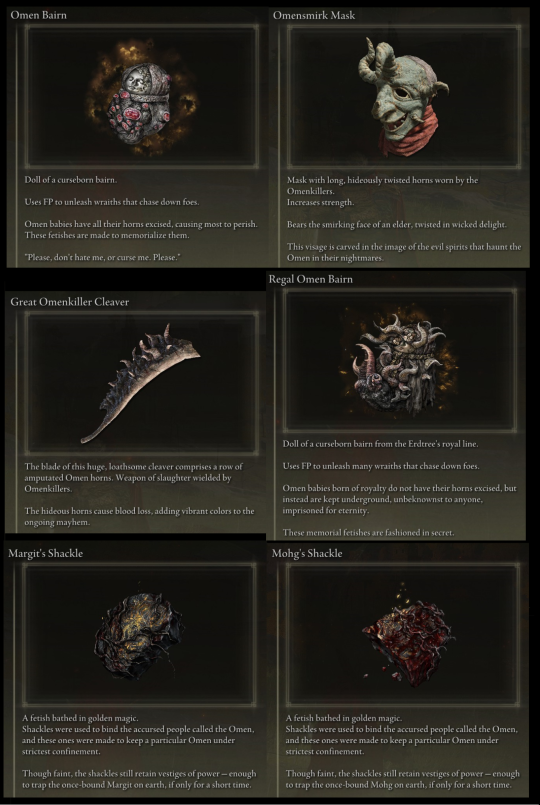
Shunned anyone who saw a vision of the Erdtree burning, regardless of who it was, and chased them away from their homes.
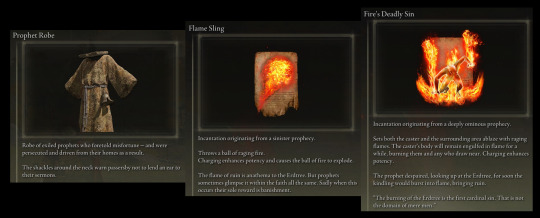
Literally allowed the belief that shorter people are somehow lesser, for apparently no reason at all (her most random discrimination decision tbh). This forces them to band together and take up honorless jobs just to get by, and in turn, people start to spread rumors of their inhuman practices, which are likely all untrue.
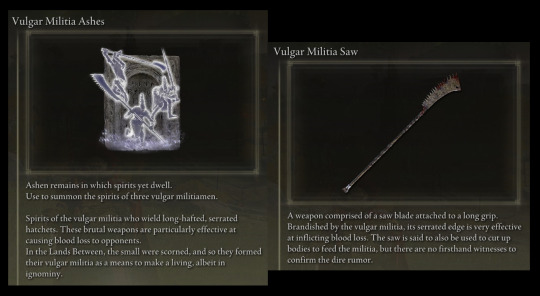
Had people literally work as slaves for the nobility just by virtue of "being born into obscurity", whatever that means. As well as other accounts of slavery like the Fallen Hawks (likely tied to the defeated soldiers of ancient Stormveil).

Likely endorsed viewing anyone without Grace as inferior beings, which includes the Tarnished that only exist because she divested them of it. She has done nothing to ease their discrimination (despite potentially seeing them as a future asset of sorts), as even the members of the Crusade are more than ready to kill us, like Fire Knight Queelign.
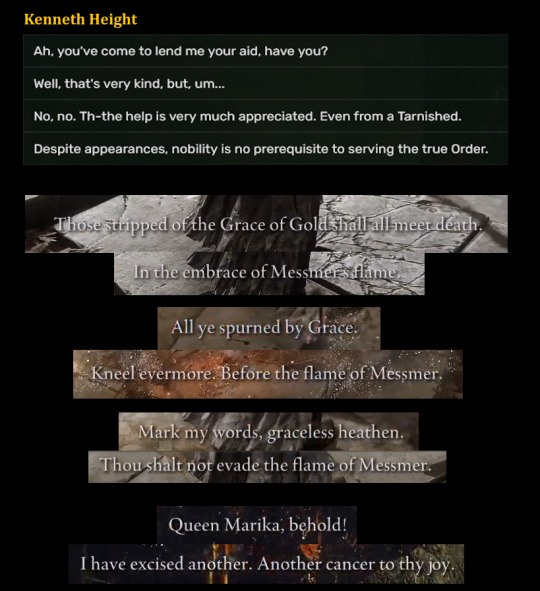
All of this was done in service to HER religion and order. Killing all the Fire Giants and burying the Nomadic Merchants alive? Oh, they could have ruined her age with those pesky flames of theirs.
Systematically oppressing Omen, Misbegotten, Albinaurics and the likes? Oh, they are impure creatures, unlike her people, blessed with the Grace of Gold, elevated from the rest. (Which is the exact same line of thinking as the Hornsent and their horns for crying out loud).

"Oh but the Hornsent stuffed her people into jars" yeah, and I am not arguing the contrary! It was a cruel, deranged practice, born of simple superstition that their victims would be reborn as "good people". But Marika's answer if you don't fit her vision of the world is to either get rid of you and your people through extermination, by literally hounding you from your rightful home, or by enslaving you.
Both sides are genuinely awful... but there's only one side that people are justifying, and it sure as hell isn't the Hornsent.
Marika's backstory is meant to make her less a god, which is all we have ever known her to be before the DLC, and more a human, which is what she once was. It gives her complexity as a character, it's meant to be the catalyst from which we learn why she took the path that she took. It is absolutely not meant to make us go "holy shit guys, Marika was the good guy all along???", because what she brought upon this world through her burning desire for vengeance has ruined it irreparably, and ruined the lives of most of the creatures who inhabit it.
This includes her ruthless, honorless, pointless Crusade against the Hornsent. Sure, it was her own son that started it, but it was for her sake. It was her who allowed him to wage it, he had her full support... until the thing turned to such a slaughter-fest that even she could not associate with it anymore due to how appalling it all was. And what better way to do that than to seal her own son away to wage war endlessly? And not just because his actions made her look bad, but also for the same crippling fear and prejudice that saw her kill all Fire Giants but one and scar the Great Caravan.
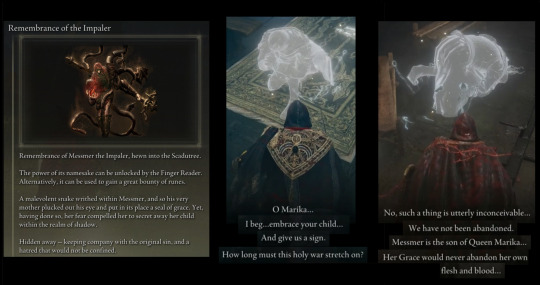
Gratuitous violence across the board, and for what?
(I want to make it absolutely clear that I don't mean you can't like Marika now. In fact, I'd say the DLC made her much more of an interesting character to me as well. I just cannot fathom seeing the entirety of Elden Ring and coming out thinking "wow Marika was the good guy" because she isn't. Heck, coming out thinking that she'd be disgusted with what her grandson Godrick is doing with grafting as if she isn't the queen of having zero empathy for those who are graceless or aren't her family, which the Tarnished he grafts are neither. She'd probably be very proud if anything. Marika is a monster. She became one the moment she obtained godhood, because no milestone would quell her. She did all the wrongs, so take this whole section as a refresher in case you had forgotten)
-
Number 2
Now, to tackle number 2... this one seemingly has more nuance, but falls for the tried and true pitfall of "the many must pay for the crimes of the few" which is exactly where it rots and collapses onto itself.
Apparently, because of the perpetrators of the Jar Rituals, ALL Hornsent, INDISCRIMINATELY, deserve to be destroyed. They all, each and every single one, deserve the Crusade and the absolute pointless ruin that it brought them. From the children, to the ones who were friends with people with no horns, to the ones who found their own practices grotesque, to the ones that weren't even tied to the Tower's religion and were just simply living their lives.
They ALL, EQUALLY deserve to be burned, to have their cities destroyed, to have their lives ruined. All of them. Ok.
Number 2 works with the assumption that the Hornsent are some sort of hive mind. Some sort of all-encompassing religious order who believes in their superiority. But that's just the Tower's religion. Hornsent are a people. And people are individuals, with their own opinions, their own lives. In fact, from the perspective of the average Hornsent citizen, they were attacked out of nowhere as they were living in peace, which likely means they weren't even at war with Marika before this event.
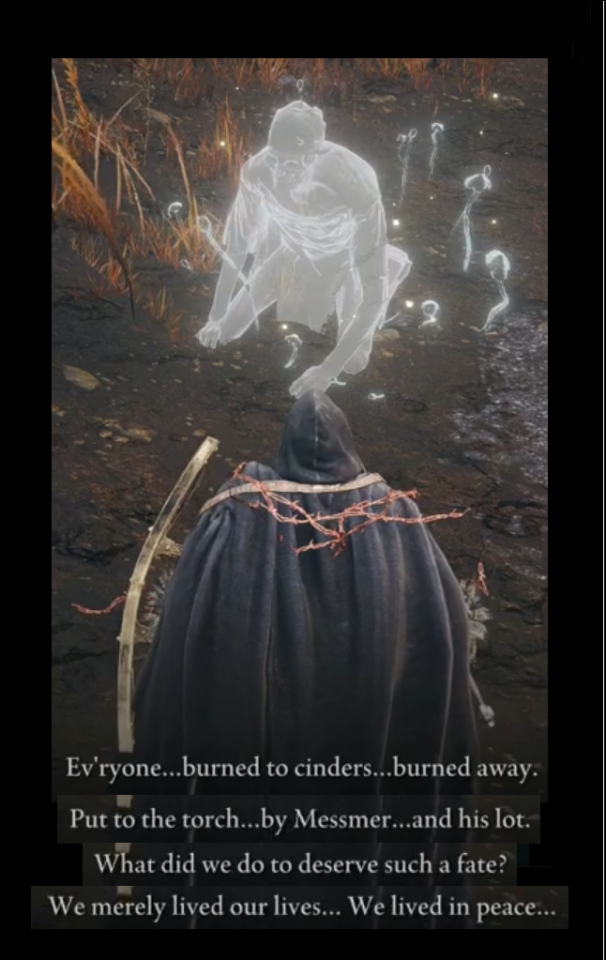
People also have the assumption that all of the Hornsent were benefiting from their society, which is blatantly false. In fact, outside the treatment of the Shamans, the people that we know the Hornsent have hurt the most are their fellow Hornsent. We know of quite a few of them suffering at the hands of their kin BECAUSE of their religious and cultural practices.
Being Hornsent isn't a "free from mistreatment" card. If anything, the large Gaols where they were imprisoned were built specifically to house them. The main prisoners we find in large numbers are commoners, the same types as the ones scavenging the ruins of their ravaged towns. They are often seen eating maggots off the floor and cowering in fear. All of them were Hornsent too, locked away for who knows what crime. Could have been big and important, small and insignificant, or even just a failure to do something properly (there's precedent), point is, it's clear the Hornsent weren't having a good time in there.
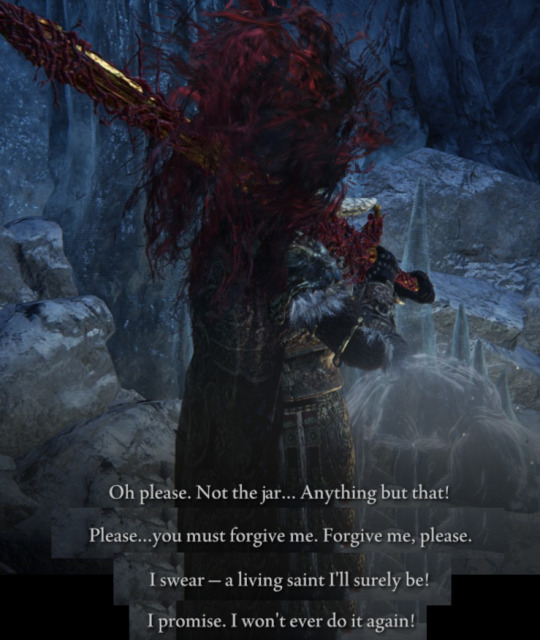
The jar rituals were used mainly as punishment for the imprisoned Hornsent themselves, as a way to have them become "good people". This was just as horrifying for the Hornsent prisoners as it was for the Shamans I assume. Look how terrified this Hornsent seemed at the prospect of sharing that fate. This is the reason why they chopped up Shamans in the first place, as ritual ingredients for a punishment meant primarily for their kin.
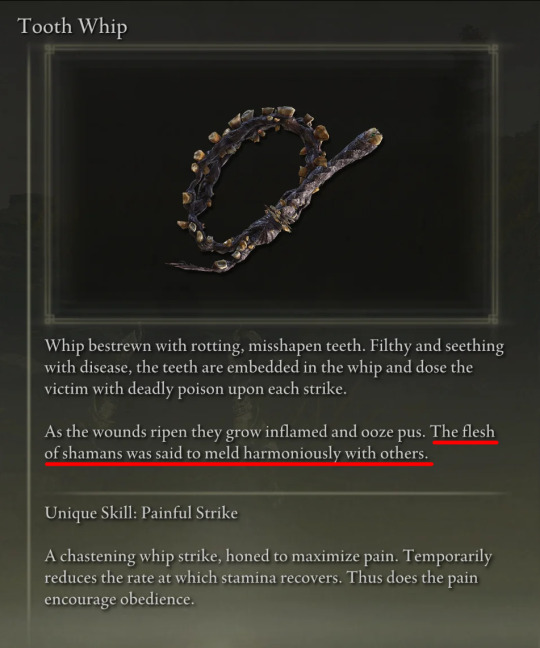
And there were more Hornsent who suffered because of the leading ideology. Curseblades were once shunned because they failed to become tutelary deities, and so they were thrown in the Jar Gaols. They were only let out so they could use their expertise and flowing movements to defend their homeland when Messmer invaded, otherwise they'd be rotting with the Innard Shamans and the other Hornsent prisoners the way Labirith is.

It's also worth pointing out that Midra's Mense was filled with Hornsent attendants who sided with their sagely master regardless of his lack of horns and what the Inquisition believed of him. If we were to operate with reasoning number 2, they too would deserve to be murdered in the Crusade because they just so happened to be Hornsent. Because ALL Hornsent deserve extermination for what happened to the Shamans.
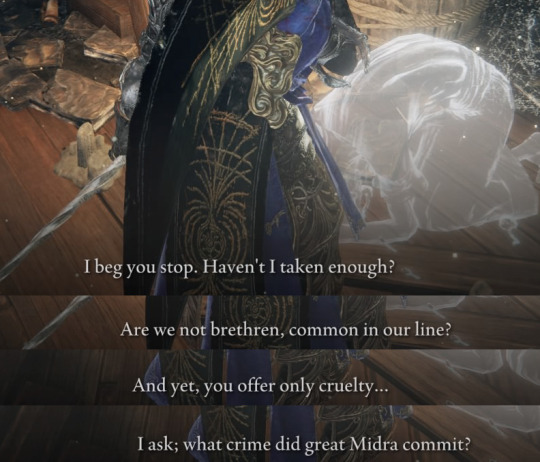
And we also know that the Hornsent can find what happens in Bonny Village revolting. In fact, we know that from someone who was born and raised there.

This sounds nothing like someone who thought any of that was ok. So who is to say other Hornsent weren't like this too, especially those who DIDN'T live in Bonny Village? Those who risked being stuffed into those same jars themselves? We make waaaay too many assumptions about an entire race, and that in itself is foolish enough.
If there's someone to blame, it's the Tower's Inquisition. They are the religious order that governs the Hornsent. They have all the power in their society... and yet, would you look at that? Enir-Ilim, their sanctum, the one place where those calling the shots reside, is completely untouched. And what about Bonny, the most structurally fine Hornsent settlement, when you'd expect it to be a black stain of char by now. But nope, no sign of Messmer activity and the Greater Potentates are just running around naked, doing their thing as usual.
The Crusade isn't even a good tool of vengeance, the only ones suffering are the civilians who were likely the ones with a higher risk of ritual jar punishment anyway. If this isn't proof enough that the Crusade is a completely petty, useless revenge war that accomplishes nothing I don't know what else to say. I'll just leave with what the people taking part in it were taking pride in doing.

These are people who, without a shadow of a doubt, would have chopped up most of the oppressed groups described earlier and stuffed them into jars if Marika had told them to do so. (Heck, something like this was being done to the Albinaurics already, as we have seen previously...)
They have zero moral superiority, their deranged zealotry is the only reason they act in the first place. Not to mention that they have no connection to Marika's struggles or past, nor were they informed of them I bet. It's likely only Messmer truly knows the reason for the Crusade, and that's only because he is her child and shoulders all the blame onto himself.
"Those stripped of the Grace of Gold shall all meet death" is LITERALLY their motto. Do you really think they stopped at the Hornsent? They were just their main target, but judging by the way all of Messmer's soldiers, including Queelign and the other Fire Knights, and even HE HIMSELF, attack us on sight for the simple fact we are Tarnished and lack Grace in our eyes, I have no doubt in my mind these people were just rounding up and killing anyone who didn't conform with the Golden Order.
THESE are the people who should be allowed to play judge, jury and executioner with the entire Hornsent race. And people will genuinely, with a straight face, tell you "That's right".
-
To conclude... I think I actually hate reasoning 2 more than reasoning 1 lol, despite not liking either at all. At least 1 is understandable. Marika is a very interesting character, one that we have known for a few years now. We have an attachment to her, heck, sentiments of her being some sort of misunderstood/rebellious figure were already there before the DLC. In that regard, I understand the emotional response, even though I still think it's a wrong mindset to have. I have at least some hope that it is purely in the realm of fiction because it's a beloved character, nothing more...
Reasoning 2, on the other hand, attempts to be nuanced, or at least pretends to be. In reality, all it peddles is the "an eye for an eye" mentality which is much too common irl as well. Not only that, but it deals in monoliths. All people belonging to a group or race are equally responsible for stuff they didn't even commit, stuff that could have even harmed them, because their leaders decided to commit crimes against another set of people. And don't get me wrong, there will be even commoners from that group or race that will agree with and celebrate that bad deed, but just as many will not, but will be either scared, powerless, already being punished for speaking up through physical violence or elaborate shunning, or currently protesting and doing something to hopefully ignite a change.
But that reasoning only exists to perpetuate cycles; of war, violence, and hate for the most part. And sadly, this mindset is very prevalent, a lot of people fail to see the issue with wanton violence as long as it's to stroke that lust for vengeance. And vengeance is a theme that Elden Ring criticizes multiple times in a row, even beyond the obvious horror of the Crusade.
#elden ring#shadow of the erdtree#queen marika the eternal#hornsent#messmer the impaler#queen marika#marika the eternal#it's just something that has been on my mind for some time#in general though I did want to do a list of Marika wrongdoings#tying it to a post about the Hornsent just felt fitting too#these sentiments are just... so ass#val-post
939 notes
·
View notes
Text
Gojo cares a lot, actually
Perspective and empathy in Jujutsu Kaisen
Once again, I see accusations that Gojo only cared about people in relation to their strength. I can't believe that 236 and 261 haven't put this idea to bed already, but let's go over it again for the class. Here are some thoughts on the importance of perspective and empathy in JJK. Spoilers for chapter 266 ahead!
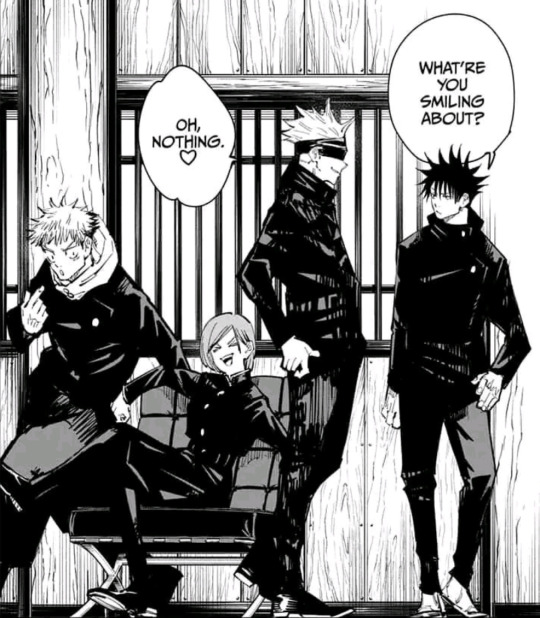
In 236, Gojo tells Geto he loves everyone. This single line, direct from the man's mouth, should be enough. However, moments later, Nanami says, "You never cared about protecting people". So why do some readers only take one of these perspectives at face value?
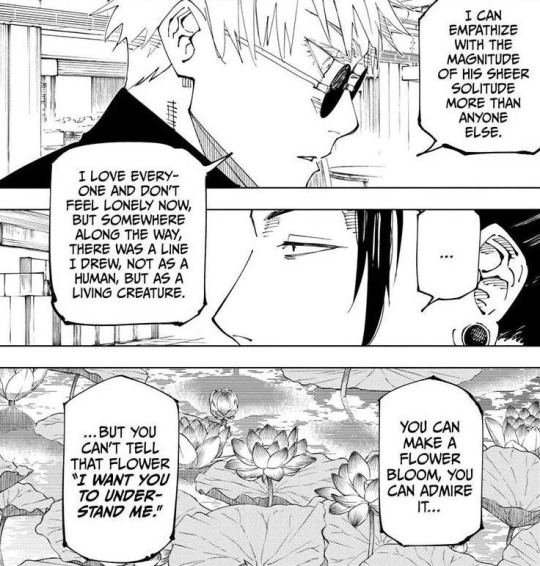
Perspective matters in JJK. Often, characters and even the narrator state things that are only true from their perspective in a given moment. What you choose to believe says more about you than it does about them — an idea I explored in my analysis of 236.
This is particularly important when it comes to Gojo and Megumi, because the moment they meet is the only (?) scene in the whole of JJK that we get to see from two perspectives.
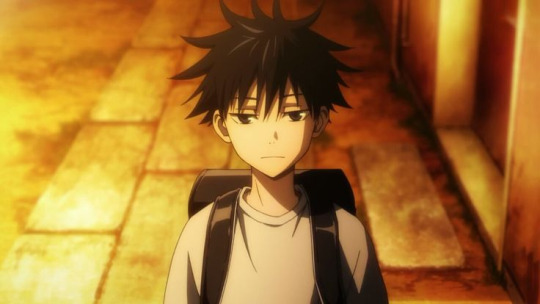


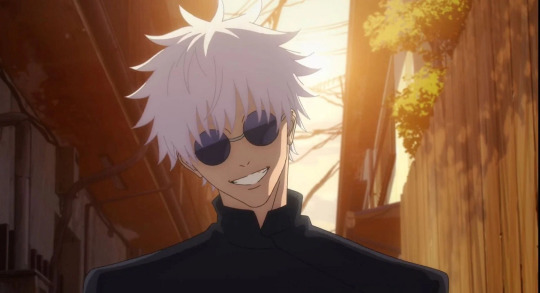
The second time, the reader understands the emotional weight of it for Gojo — but Megumi doesn't. He's kept in the dark, so of course he thinks about their meeting in different terms.
Once again, whose perspective are we going to take at face value? From Megumi's point of view, he wasn't offered a choice. From Gojo's point of view, he extended to a child the little agency available to him.
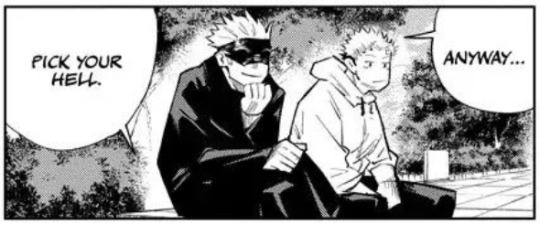
Offering a choice is something Gojo does consistently throughout JJK — pick your hell. It's one of the ways he shows care for others that goes unrecognised, so it's ironic that readers and characters alike misinterpret it for a lack of empathy. However, this is no coincidence.
For much of the series, Gege keeps Gojo at a narrative distance from the reader. Most of what we know about Gojo comes from what other characters tell us, and our view of him is therefore coloured by their perspective.
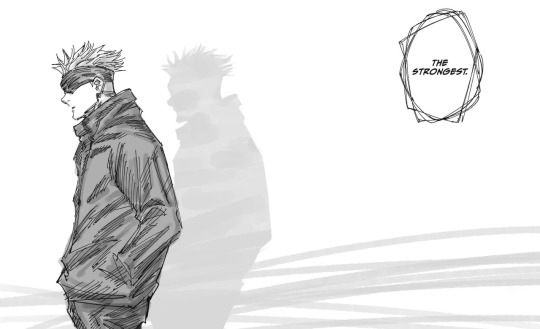
However, while Gojo laments the distance between himself and others, he fails to recognise that he's the one maintaining it — and not because of his strength or his technique. He has admirable goals, but he chooses to work towards them alone.
There are many occasions where characters reach for Gojo, but he refuses to let them past his metaphorical Infinity out of a sense of duty and perhaps misplaced belief that he alone can or should bear this heavy burden.
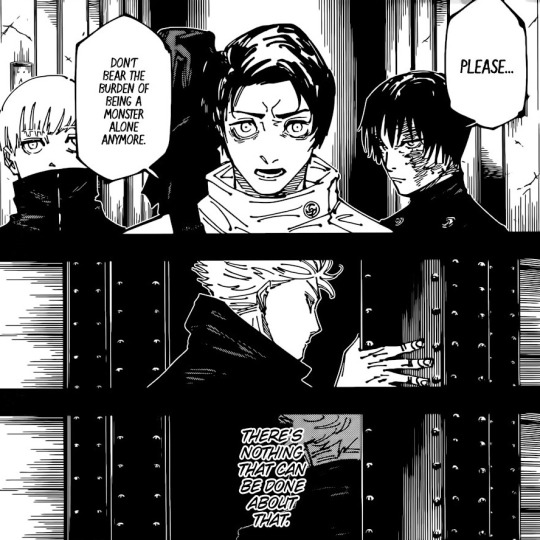
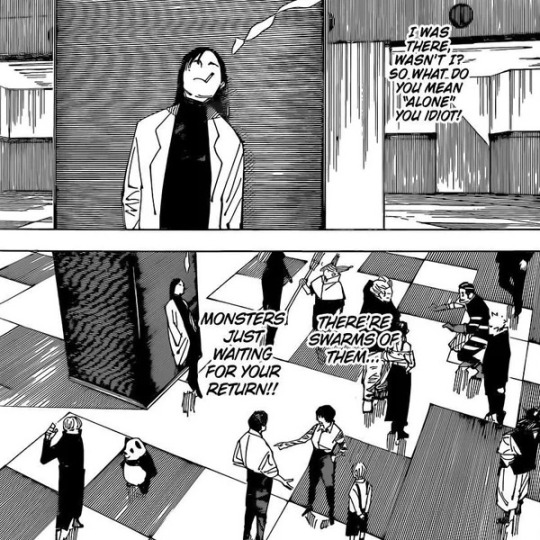
All of Gojo's actions are about preserving the humanity of others at the expense of his own. That's precisely why he chooses to become the "monster" alone. In this way, Gojo is flawed but he isn't uncaring. Again, it's a matter of perspective.
Gojo sees strength as the solution because it's all he's ever known. However, recognising the strength of others doesn't mean that's all he sees — because Gojo knows that dehumanisation acutely. What's more, 261 also suggests he thinks of "strength" in different terms to others.
When they meet, Gojo tells Megumi not to get left behind. However, he later says he was "left behind" when Geto defected. We know Gojo's physical strength eclipsed Geto's, yet Gojo only refers to himself as "the strongest" alone after Geto dies.
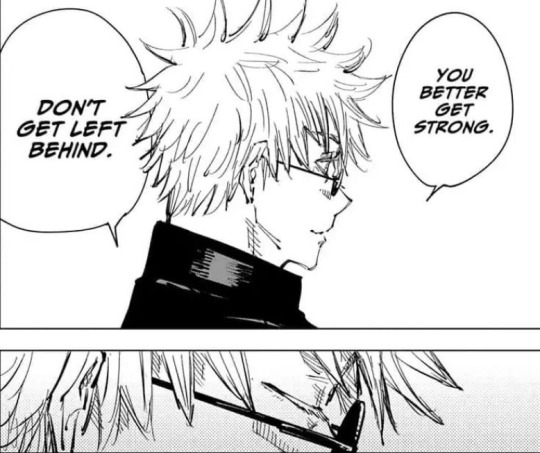
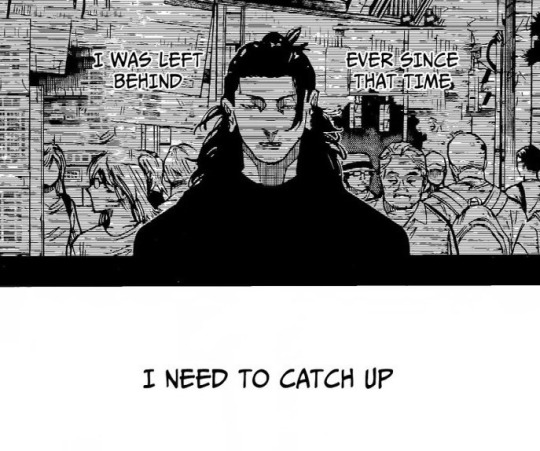
Before that point, there's nothing in the text to suggest that Gojo ever stopped thinking of the pair of them as "the strongest" — as a unit, as a duo. This suggests that strength, for Gojo, is something much more intangible, much more sympathetic, and much more human too.
What do the strongest characters in JJK all have in common? Indomitable will, courage in their convictions, an overwhelming sense of self. Looking at strength through this lens shines a new light on Gojo's goal of raising "strong" allies.
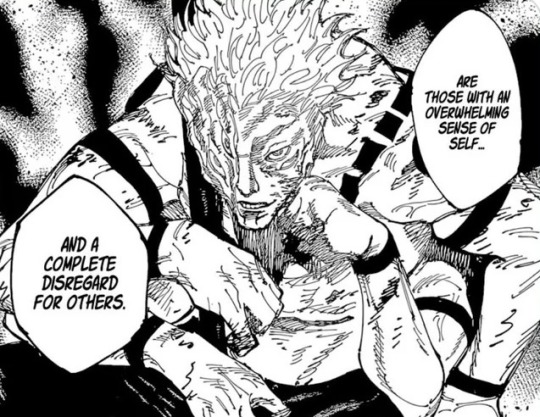
When he forces a third option in Shibuya, Gojo proves that strength doesn't have to come at the expense of compassion. In the later chapters of the Shinjuku Showdown arc, Yuta, Yuji, and the rest of Gojo's allies reinforce that idea ten times over, and I have every belief that Megumi will soon do the same.
To suggest Gojo only saved Megumi for his technique is unfair when he has consistently proven himself committed to protecting the futures of others, even "weak" non-sorcerers who have nothing to offer him. Once again, it's all a matter of perspective.
Gojo's way of caring is still caring, even if it doesn't look familiar to you. His only flaw was closing himself off from others and choosing to care from afar. However, just like Gojo never stopped reaching for Geto after he left, Gojo's allies never stopped reaching for him.
There's a phrase we use to describe looking at things from another perspective: putting yourself in someone else's shoes. I think it's very telling that Gojo's allies have taken that literally — Yuta by stepping into his skin, and Yuji by standing in his place in 266.
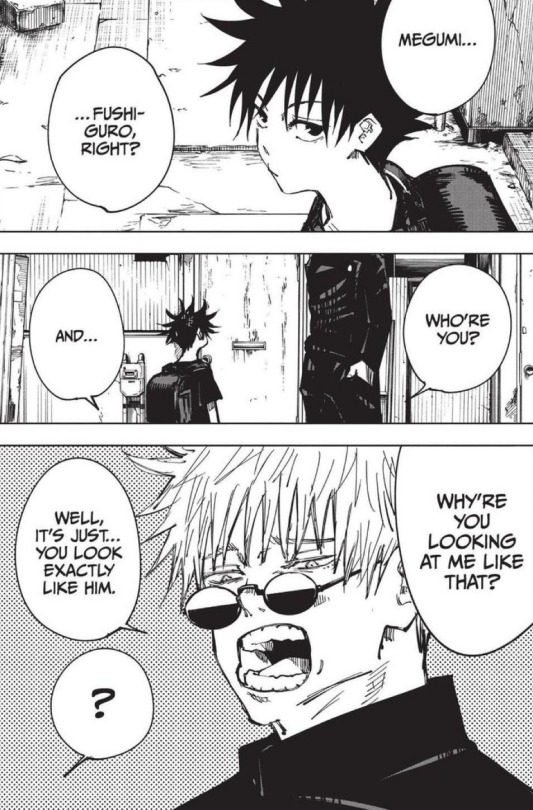
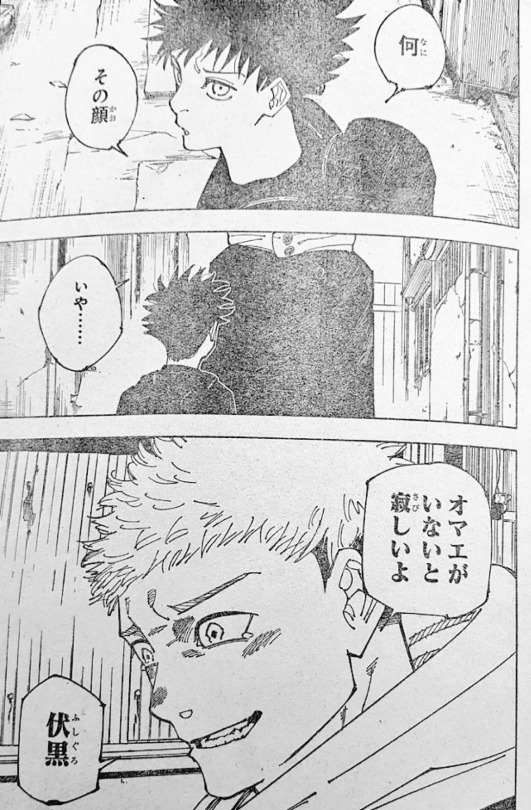
TL;DR: Gojo cares a lot, actually. If Gojo talking about his innermost feelings can't make you empathise, and the students he supposedly "doesn't care about" recognising his burdens can't make you empathise?
Well, that says far more about you than it does about him.
Come read my fics about this!
In His Shadow explores the ways Gojo keeps his distance from Megumi, who isn't equipped with the tools he needs to reach him but finds his own ways to show he cares, born from ten years of history together.
Rivers Crossed, Mountains Scaled explores Gojo and Megumi's relationship through the vehicle of SatoSugu — why Gojo took him in, whether Gojo really gave him a choice, how Gojo sees him.
Hope you enjoyed the post! I love you, Gege Akutami ♥️
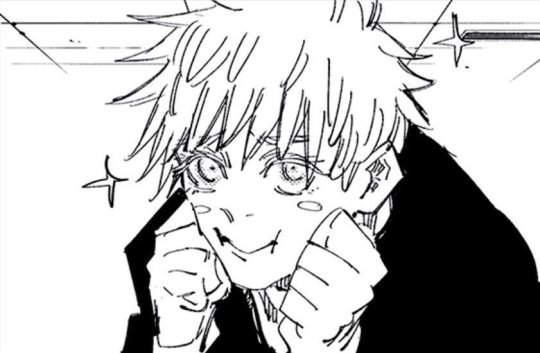
#jujutsu kaisen#jjk#jjk 266#呪術廻戦#gojo satoru#fushiguro megumi#jjk spoilers#jjk manga spoilers#jujutsu kaisen spoilers#jjk meta#jjk analysis#jujutsu kaisen meta#jujutsu kaisen analysis#glo's writing#glo's analysis#fushiglow
610 notes
·
View notes
Text

I made a character sheet to plot your OC's development over time! (There's supposed to be a character name in the big white space next to "over time" but it got eaten a little lmao)
You can use this for whatever you want, and you don't have to credit me. Feel free to change or edit anything you feel like. Please don't tag me if you credit me - just link to the original post.
Credits, explanations & a transparent version under the cut :D
Credits:
The actual image was made with the free NBOS character sheet creator, which is a sort of dated but free and solid text-layout sheet maker intended for ttrpg style character sheet creation.
Fonts used were Bisdak (titles) and Rockwell (body). Both are free! You can use them to fill it out if you like.
Inspired by a comment @maybe-solar-powered-calculator made on this other post about filling it out for characters at multiple points along their arcs. Thanks for putting the idea in my head :D
This is explicitly released under a CC0 1.0 deed, ie: you can do fucking whatever you want with it and I don't care and you don't have to tell anyone where you got it from and no one gets to stop you.
-
Last time I made one of these I got a bunch of questions on all manner of things, and I can never keep up, so I'm just appending a set of notes for how to use it and a glossary because I know some of these phrasings will be confusing.
Ignore or change anything you don't feel like works for you here. You can do whatever you want forever.
Suggested / intended use & general notes:
This sheet could work for something story-level, if you want. But it's really only good for individual arcs; if the character goes through multiple arcs in your story, then they're going to fit poorly here. In that case, you're probably better off doing versions for each arc, or just adapting this to a different format more suited to your thing.
Also, if your arc has a nontraditional structure - divorced from the typical "rising action - climax - conclusion" type of structure where there's a clear 'important turning point' - it may not work as well either.
The mindset section is meant to come at it from a 'golden mean' standpoint - that is, everything on either extreme of the slider is 'too much' and therefore bad. It's not bad-to-good! The far right side is a flaw too. They're only grouped the way they are on basis of the specific OCs I personally had in mind when I put it together.
Growth is labeled 'worse'-to-'better' but it means, like, active decrease in that area vs active increase; if nothing changes, it should stay at the center even if it sucks. The category is about contrasting changes, and sometimes changes are for the worse!
The entire sheet is very deliberately subjective. It should really be answered from the character's perspective - how they feel about it, not what's necessarily true. Technically you can do whatever you want and I can't stop you, but it's a better tool if you approach it from the point of view that the character may believe things that aren't true - that will define their behavior way more than the objective facts of the story.
-
Definitions:
This part is long as hell - recommend using ctrl+f to find the specific words you're stuck on. I defined everything.
General categories:
Mindset: how your character thinks about themself and how they act. Their understanding of their own approach to life. Attitude, viewpoint, decision-making process, that sort of thing.
Circumstances: the relationship between your character and the world around them. Where they are, what that place is like, and how they feel about it.
Growth: how the character and their impact - their attitude, their behavior, their immediate surroundings - changes over time.
Outset: the start of the character's arc.
Present: the 'center' of the arc. If you're planning something ahead of time and it hasn't 'happened' yet, then this is the near future.
End-game: where they are after the conclusion of the arc.
Mindset terms:
Center of the world: "If I have a problem, it's the only thing that matters to me." Self-centered, self-absorbed. Doesn't necessarily mean anything beyond that - they don't necessarily have to be unpleasant to be entirely focused on their own life.
my life isn't relevant: "Everyone else's problems are so significant, I don't pay any attention to my own". Someone who ignores or neglects their own life in service of some other thing, or doesn't consider their own behavior to have any real importance.
Only see enemies: Paranoid. Everyone's out to get them. Anyone who seems nonthreatening is hiding their potential for danger and everyone who seems threatening is a threat. The character must remain ever-vigilant, lest the cashier at the 7/11 suddenly stab them, or their best friend turn out to secretly be trying to poison them to death.
Only see friends: Naïve. Everyone is a good actor who wishes everyone else well, and if they don't seem like they're acting from a place of kindness or care then you probably don't understand what they're up to. The character is pretty sure the stranger holding that knife is, like, someone to chat up maybe, they're clearly only hanging out in this dark alleyway because it's a nice spot and no other possible reason.
overthink everything: Ten thousand thoughts per every single action taken. Maybe they never get around to acting at all. They have to consider every possible outcome. What if by eating lunch they accidentally trigger the apocalypse?! Who's going to think about these things if not them?!?!?!
impulsive to action: Act first, think never. What do you mean "consequences of actions"?
Unilateral decisions: "I will make every choice and no one else's opinions or thoughts are relevant". Discounts outside suggestions. Firmly convinced that they know best in any situation, and will brook no disagreement with their views when it comes to actually doing things.
Command me, please: "I don't know what to do and I don't know what to even start with, someone please tell me what to think". No confidence in their own views. Will not make any decisions unless forced and even then will beg someone else to please tell them what to do. Has no idea what's best and is pretty sure anyone else will have a better idea.
can't ask for help: No one will ever help the character; they have to do everything themself, even the things other people have repeatedly offered to do for them and have much more experience with. Doesn't necessarily mean that no one will help them or that they are explicitly barred by some real-world circumstance; just that, for whatever reason, they refuse to ask for help. This is an attitude thing - will they ever reach out? No? Then they're here.
too reliant on others: Have they ever solved a problem alone? Do they believe they're even capable of doing so? The character all the way at this end of the scale absolutely never expects to be able to do anything themself, has no trust in their ability to solve a problem, and needs someone else to come save them from it. The kind of person who needs ChatGPT to do their homework. Again - doesn't actually mean anyone will help them, or that the people they're relying on are reliable - just that they think they are helpless without ... well, help.
Weapon maker: This has to do with problem-solving strategies and not actual weapons. The weapon-maker is a character who views every situation as a conflict that cannot be de-escalated or solved by cooperation, and responds appropriately. The most fundamental weapon maker character turns everything into an argument, a fight, a war, etc. There are a bunch of other responses to conflict, though - they might avoid problems that need solving because they avoid conflict generally too. Fundamentally what you want to answer here is: when they see a locked box and they don't have the key, do they respond to it the same way they'd respond to someone telling them "you can't open this box"? And how do they respond to that? Typical weapon-maker approaches: - brute-force the box open or try and then give up if it doesn't work; and also get into an argument that might turn physical with the hypothetical person - shrug and give up immediately, in both situations so on and so forth. Another hallmark is that they kind of suck at problem-solving and give up if brute-forcing a problem doesn't work. This is not someone who is picking locks unless someone else told them to - they have one solution, it's to make everything into a conflict, and then to win that conflict by beating them or to give up because they think they'll lose.
Tool maker: This person approaches every situation like it's a puzzle, not a fight - up to and including actual fights. Tool-maker characters generally assume that a situation can be solved by just finding the right approach and doing it the clever way. There's the same fundamental question as above - if your character sees a locked box and has no key, would they approach it differently than someone telling them they're not allowed to open the box? 'Typical' tool-maker approaches: - I can trick the person into giving me the key by saying the right things, and I can also pick the lock because fundamentally there are 'right answers' to both of these - If i make friends with this person, they might change their mind, because now we're cooperating. I can still pick the lock because there are 'right answers' there. - The person has a reason for wanting me not to open the box, so I can definitely figure out what that is and solve the reason so then they'll let me open it. I can take whatever it is even if they really want to keep it if I just find the right answer. I'm going to break this box into little pieces because that's the easiest way to get into it but I could probably open it some other way if that wouldn't work.
A note - the center of this bar is someone who generally has different responses to different kinds of situations - like, in the box example, they'd approach the box and the person with two different general attitudes and processes - but generally responds to those situations using the same kind of decision-making process for each category every time. Most people are nowhere near either extreme. Characters tend to be classifiable into weapon-maker and tool-maker because they are fictional and it's easier to define one kind of approach than many. Approximately average approaches: - pick the lock if no one's around, but give up if someone is there because someone telling me not to open the box is a conflict i think i'll lose but a locked box is just a puzzle that i can solve - argue with the person, but give up on the box, because they're approaching the box as a puzzle and they don't think they have the skill to get into it, but the person is someone who can be convinced or bullied into handing over the key
I made this particular dichotomy up, which is why I think I get a lot of questions on it whenever I put it into anything, but I also don't know of any other snappy way to describe this sort of thought or approach variance, and it's genuinely useful for character writing in my opinion.
Pessimist spot-finder: Generally a downer but not necessarily. This kind of character just approaches everything with a close eye for problems, issues, reasons to find fault. If they're miserable, it might be why, but like, they can be a cheerful spot-finder if you want, I just wanted to get at "the glass is half empty" and "the glass is half full" more than anything.
Optimist upside fan: The opposite. "The glass is half full". If there are problems, they can find something about them that's not so frustrating or bad to focus on. Pretty damn good at overlooking minor issues if there's no reason to fixate on them. Not necessarily cheerful.
Abysmal company: could not give less of a damn about treating people the way they 'should' be treated. Maybe they take pride in that. Maybe they just think it's irrelevant. Either way, they know they treat people badly and they don't see any reason to stop. Does not necessarily mean that they treat people badly if they think they're doing the right thing and are wrong. Doesn't mean they're actually pleasant or unpleasant to hang out with, either, unless you really want it to mean that.
Decent to others: treats people well as a matter of course, or at least they sure think they do. Makes an effort. Would probably care and/or consider changing their behavior if someone said they were treating someone poorly. As before - they can be completely un-self-aware and just think they're doing right by people while treating them completely horribly.
Morality is irrelevant: 'abysmal company' for broader approaches to life and problems. Maybe they just know they're myopic and don't think other people's problems matter. Maybe they just gave up on trying to differentiate between 'good' and 'bad' and outsourced it to someone else or stopped paying any attention. Maybe they just like to take morally unjust actions and can't be bothered giving a damn when someone points out that they're morally unjust, or maybe they're proud of it. Kind of a villain trait generally, but not necessarily - it doesn't have to mean they act badly, just that they don't care if they do. Also, this is about how they choose their own actions and view their own behavior. They can think morality is relevant for other people as long as they ignore it when they act themself.
Always in the right: feels morally righteous in every decision they make. Standard superhero type of trait. Doesn't necessarily pass judgement on others, doesn't necessarily act well according to everyone's moral code (see: blue and orange morality), but they are extremely principled and will never deviate from the moral code they personally believe in. And they do genuinely believe in it.
Circumstances terms:
Generally terrible to generally excellent: how subjectively decent is your character's situation, overall? If they think everything is horrible, but the situation is charmed to everyone except them, then it's generally terrible.
Need for changes to passive tolerance: will they do something about it? Do they feel like they have to?
No agency in action to decisions are huge: agency being "how much power do I have to make changes here?", this just asks how much they have. No agency means that, no matter what they do, nothing will happen - they might be locked in a cage or somehow otherwise completely unable to use any sort of power at all, even the power of just leaving. The other end of the spectrum is where every decision the character makes makes a huge difference, not just to themself but to everyone around them as well. They can start wars, they can have anyone they want killed, they can do anything whenever they feel like it. If they think they have no agency even though they do actually have agency, they don't have agency here. If they feel like they have all the agency in the world and can do anything, then they do even if it's not true. It's perceptual again.
Stakes are deadly to mistakes solvable: what are the consequences of failure? Will you die, will you lose status you can't afford to lose, will you lose belongings, will you have to apologize, will nothing happen at all? Mistakes solvable is where they think every mistake is solvable forever - the character pushes someone through a woodchipper and they come out and to fix it, maybe an apology has to occur, but not much else. Does not necessarily mean no one gets hurt or killed as long as the character thinks there are no permanent consequences. This is the most important one on this section to keep subjective because it will greatly influence how your character approaches situations. A character who thinks everything is deadly-stakes may go to cartoonishly-extreme lengths to avoid turning a report in a day late. A character who thinks all mistakes are always solvable may push someone through a woodchipper and then just assume they can say they're sorry and it'll all go away. The setting and their approach do not need to be applicable.
Needs go unmet to attended with care: how do the people around them treat them? Do they pay attention when the character needs something, or do they ignore it? Does the character have to do everything themself around here, or are there people who will help out?
Regarded poorly to regarded well: how do they think other people see them? Are they respected, are they liked, or are they disliked? Do people broadly trust them or are they pretty sure everyone regards them with suspicion?
Nothing changes to changes in seconds: functionally the 'stability' meter of your setting - is the situation generally stable, or are things constantly changing? Does your character feel like every five minutes, there's a new problem that needs dealing with, or do they feel like nothing has ever happened ever?
Growth terms:
Changes in place: do they go somewhere else? Does the physical setting otherwise change (eg; earthquake, war, etc) ? Are there any other reasons that the 'vibe' or 'experience' of the place is different from before?
Change in power: does the character's percieved agency (see: no agency in action to decisions are huge) change? Alternately you can use it if they've gained or lost power in some percieved way (deposed, assigned a commanding position, etc).
Change in bonds: do their relationships with people change? Have they made new friends, lost old friends, changed the nature of their relationships with friends or partners, etc?
Change in beliefs: straightforwardly, have their beliefs, morals, etc, changed?
Change in hurts: have they undergone some horrible experience? Do they have past trauma from some pre-arc horrible experience they're healing from and/or discovering they're more powerfully subject to? Did they experience a physical injury that they're recovering from or which materially changed their life? Did something recent dredge up old issues? So on and so forth.
Change in hopes: Do their desires for the future look the way they used to? Do they care about different things now? This is something the character is not actively working for, but may be tied to actual goals.
Change in fears: are they overcoming fears? Growing past them? Gaining new ones? Are they scared of shit different from how they used to be?
Change in goals: Not the same as a hope because it needs to have a specific, achievable outcome the character is actively working toward. Do those material goals look different? Perhaps they no longer want to work against something, maybe they didn't have any goals and now they do. Or maybe they've realized the goal is impossible, or something has happened to make that goal unachieveable. Whatever it is, if there's a change, it's a change.
Change in self-awareness: their beliefs about who they are and what they're like, and what their circumstances are. Have they gotten more self-aware, have they gotten less self-aware, or has nothing changed?
Change in relationships: their relationships' overall health and resilience, as far as the character is concerned - which doesn't mean they're necessarily good, just that the character thinks they're how they're supposed to be. Have they improved? Have they gotten worse? Have they not changed?
Change in knowledge: do they feel like they know more about the world, their place in it, the people around them, etc? Not necessarily how to do things - just general information and awareness.
Change in social standing: how does others' regard for the character change over this part of their arc? Do people like them more or less? Are they respected more or less than before? Has nothing changed? And so on.
Change in skills and abilities: do they feel more skilled than they were before? Do they feel like they know how to do as many things as before? Again - not necessarily rooted in reality - a classic example of a character being wrong about this is a 'big fish in a small pond' character who used to be the high school sports star going to college on a sports scholarship and discovering they're not the best any more, and suddenly feeling like they're the worst - when they're better than they've ever been in an objective light. Use a subjective viewpoint for this.
Change in agency in life: how does the character's percieved agency change? Do their decisions matter less now than ever? Do their actions make way more happen than before? (See: no agency in action vs decisions are huge)
Change in outlook: Here's the upper/downer part. Are they more or less hopeful for the future? Do they think things are more terrible now? Are things improving as far as they're concerned? Or has that not changed?
Change in goal progress: how do they feel like they're progressing on the goals they've set for themself? Are they getting further and further away? Are they getting closer?
If some of this doesn't make sense and you want a clarification, you will have to tag me to get my attention, because I'm turning notifications for this post off the minute it leaves my immediate social circle.
Transparent version: (sorry you had to scroll so far)

#thank GOD we can just turn notifications off now so i wont have to delete this post#red rambles#also. if you want to follow me for this because someone reblogged it. Don't i make like one of these every [checks notes] 2 years#typically i just reblog a lot of nonsense and you will not enjoy it probably#im writing this like i expect it to take off because i do . Because i'm scared#character sheet#red makes memes#<- because those are the tags i used on the last ones#i dont really think this quite qualifies#oc reference#what fucking tags are there for this sort of thing lmao#ttrpg sheet#ttrpg tools#i know people want this for ttrpgs. if everyone used the other thing for ttrpgs.#oc tools#i was gonna make a fillable version but i gave up. someone made a cool one of the ancient blorbo sheet but tbh i have no idea what the fuck#they're doing with js modules (<- everyone point and laugh i dont know javascript LMAO) and i dont feel like figuring it out#hey guys its midnight im out of post jail. image upon ye#ALSO you CAN put your sheet on the post i dont like. Care#like i said a zillion times. I will be turning notifications off if too many people say things#but until i get really sick of everyone filling things out the same way im curious#you understand.
160 notes
·
View notes
Text
It's the way "I just think there's no one out there who wants the best for you more than I do" is true because it INCLUDES FADEL HIMSELF. Fadel is so steeped in his anger and hurt and fear right now that he can't even see how loving and being loved by Style is the door to true freedom.
But he's also nowhere near ready to handle that, emotionally, so Style will give him this honesty and then demand nothing from him and move right on to nipple play (familiar, and therefore comfortable, territory - because at least Fadel has a rulebook to follow in this situation). This reminds me of that time when Fadel told Style about his parents' murder and then Style said "I'm sorry" and then abruptly changed the subject. He senses when Fadel isn't ready to actually face the issue, so he'll give Fadel the space to process what's going on - be it his own shocking ability to be vulnerable to Style or the truth of Style's earnest love for him - in his own time.
Just. The selflessness in that. It would be so much easier for Style to push right now -- to force Fadel into the discussion about how Style actually was very much a victim of the combined circumstances of Kant and Bison and Fadel's past. Lest we forget: Style is the ONLY ONE not embroiled (as far as we know as of ep 8) directly with any of the criminal aspect of this universe. He was just a relatively innocent bystander who got into an accident because he was texting while driving, flirted a little bit aggressively because he found Fadel hot, and then got dragged into a game of lies and deception and power without having a clue about what he was getting into until his own heart was irrevocably compromised. (Like no, I'm never letting my Style apologist post go.)
But none of that matters to Style; the weight of Style's care, the way it's informed and threaded through with his own experience with grief and mourning, makes him infinitely more concerned with giving Fadel room to be angry, to be harsh, hell to even hurt him with his dismissal of Style's sorrow and fear. Style understands what it means to need space to grieve and hurt and he is literally making that space for Fadel.
And this is so important because Fadel is so very repressed. Like you know this is a man who hasn't actually emotionally processed a thing since his parents' murder. And who can blame him? He was a just a child. And then he was taken in by a woman who gave him the training and the tools to ensure that he would never be physically vulnerable again but also taught him to completely close his heart to love and trust. I don't believe for a second that Lilly cared one bit about Fadel's (or Bison's, for that matter) emotional wellbeing.
This is why Style is so perfectly suited for Fadel. He may not have the same experiences or lived a life as volatile and violent as Fadel, but the things he has experienced makes him uniquely suited to treasure and mend Fadel's fragile heart.
Fadel needs to allow himself to let go sometimes, to have some fun for once, to face and accept the reality of his own emotions. They both have to learn how to love and be loved, and its fascinating how ideally suited they are to teach each other these things. -- I wrote this on my thoughts on Style after episode 1 - and by god is this show paying it off!!!
I just. I'm so grateful to this show for giving us this. I know it's not prefect, there are things I wish the show had lingered on or left out, but by GOD there are some absolute diamonds in this story that render me overwhelmed with love for these characters.
#the heart killers#fadelstyle#thk ep 8#thk meta#fadelstyle meta#hui talks thk#this show has become so important to me in ways i can barely comprehend#i know i'm somewhat repeated myself but it just hit me again and i needed to get the words out
108 notes
·
View notes
Text
LOVING YOU IS ALL I NEED!
( batter , first officer & forward relationship h/c's ) + gn!reader



# think of this as a pt. 2 to this fic , grammar and spelling warning
INTRO
How these men show their undying love for their one and only—you.
꒰wc꒱ 1.1k

✦— THE BATTER
Ganji Gupta didn’t dare dream of the day he’d find his one and only, his true love, someone to grow old and tired with until his heart gave out on itself. Unfortunately, his newfound situation halted any progress he could’ve made.
That was until you arrived at the manor with a letter to hell in your hands. That was until he got to know you better. That was until you shared your first kiss on New Year’s Eve. Ever since then, he’s been completely and utterly yours.
Ganji Gupta is the type of man to show his love and devotion to you through meaningful Acts of Service. There’s little to nothing the Batter wouldn’t do for you. He isn’t above taking hits for you in matches when needed, and he will use his last ball to save you from getting sent back to the manor.
Ganji Gupta who, as much as he loves being on his own, gets a bit lonely at times. Therefore, he loves nothing more than to spend some Quality Time with you. He prefers long walks around the perimeter of the manor and also enjoys getting to rest his head in your lap as the two of you lounge about.
Ganji Gupta teaches you the recipes passed down to him by his Mother. It makes for a great way to spend time together whilst making sure he doesn’t forget them in the process. Cooking with you brings back bittersweet memories and reminds him of his Mother all too much.
Ganji Gupta frequently wakes up from relentless night terrors. He’s heard of other Survivors describing their own experiences with them but didn’t think it would happen to him. Now he finds himself waking up in a cold sweat and alone in bed with nobody to calm him down. This leads to him sleeping in your dorm room more often than not in a way to help combat these nightmares. Hopefully, he can get some rest tonight thanks to your help.
✦— FIRST OFFICER
Who doesn’t know the brave young man Jose Baden? The Sea Knight who wields a pocket watch said to have been blessed by Posiden himself, the artifact that always ensures smooth sailing? The First Officer is punctual, humble, and always knows what he wants. He just didn’t expect it to be you.
Nonetheless, the heart can guide a man better than any map can. He may indeed have fallen for you first, but you undeniably fell harder. Although, who wouldn’t with the way he constantly sweeps you off your feet?
Jose Baden is always true to his words when it comes to you, and therefore showers you with Words of Affirmation. It makes communication between the two of you much easier when there’s nothing to hide. And there are only so many words to describe his love for you, so we’ll have to start from the top and work our way down.
Jose Baden, who cannot keep his hands off you. No matter where the two of you are. Physical Affection is this man's specialty and has been embedded into his DNA. It's the simple things like his pinky finger being entwined with yours or his arm around your shoulder, holding you close.
Jose Baden isn’t afraid to show his love for you in front of others and would never shy away from it. It’s truly a gift to be head over heels, so why hide it? Why not show off what he’s got and everything that’s so precious about ‘em?
Jose Baden who can’t help but take a hit for you in games. He doesn’t ever want to see your blood spilled, and would rather have his coat on the map instead. He’s ready to face the stern talking you’ll give him after the match, but you’ll patch him up anyway.
Jose Baden doesn't like admitting the fact that he misses the sea badly. The things Jose would do just for an evening back on the ocean are wild and many. The closest thing he's got is Lakeside Village, but even the calming waves that brush upon the shore can't heal the pain in his heart. The Officer will admit his feelings to you in an act of desperation and comfort. And comfort he receives from you. From cuddling and listening to him rant about the ocean for the 100th time to peppering his face with soft kisses that seemingly never stop.
✦— FORWARD
Said to have been the creator of Rugby himself, you always want William Ellis on your team. He successfully lifts the spirits of all his teammates while headbutting into the Hunter just before they use excitement. It's the thought that counts, right?
To have William in your corner means to have someone who is with you through thick and thin. Someone who will stick by your side until the end of time itself. And until you can finally realize just how much the Rugby Star adores you.
William Ellis who can’t help but hold you close. Physical Affection is this man’s go-to for showing how much he loves you. Like Jose, he will never feel embarrassed or ashamed when showering you with his form of love and affection. He’s either got an arm around your waist or your hand in his—there’s no in-between.
William Ellis loves Giving Gifts just as much as he loves Receiving Them. While the Forward’s not the best at picking out pre-made gifts, he is the best at making ones straight from the heart. Using his clues and fragments, he’ll craft something he finds worthy of gifting you. Whether it be something like a small, red box in the shape of a heart or a bracelet that has your and his initials on it, the gifts are all made with you in mind.
That being said, William Ellis will treasure anything you gift him in return. And that can be anything. Silly little notes passed underneath the table during dinner. A beaded anklet that has left a tan mark because he never takes it off. Or a smaller version of his Ruby ball with every stitch being almost exact.
William Ellis who’s afraid he might not be good enough for you. Who fears that one day he may be forgotten by everyone he’s ever loved. Maybe that’s why he works so damn hard. To prove to himself (and others) that he’s worth remembering. Fortunately, there’s no need to go the extra mile when it comes to you. William’s proven himself more than enough already, hasn’t he?
note: a little gift for all my Ganji, William, and Jose lovers out there. made 4: @rieuvie + @williamkisser + @ch6douin +@jklovu + @5ku11h34rt

(2024) ©️fishermanshook — do not steal, translate, plagiarize, or repost my work on any other platform
#⋆˚ 💗˖° HEAD OVER HEELS!#idv x reader#fanfiction#identity v#identityv#begginer writer#idv#fanfic#identity v fic#identity v x reader#William Ellis x reader#Eli Clark x reader#forward x reader#jose baden#Jose Baden x reader#first officer x reader#idv seer#idv fic#idv fanfic#idv forward#idv first officer#x reader#fic#ganji gupta x reader#ganji gupta
171 notes
·
View notes
Text
On the day of Christmas, my true love gave to me
Pairing: Chuck Bass x f!reader
Genre: fluff, hurt/comfort
Warnings: x



24th of December is nothing. At least not to Chuck Bass. All he can remember from those so-called Christmas Eve are either baquettes that his father was invited to or some quiet days in apartment suites, when he was still too much of a child to attend Christmas parties for New York business elites. Therefore, 24 of December is just that - a 24th day of December, 358th day of the year (359th if it's a leap year). That's, at least, until he met you.
//24th of December//
//3pm//
You sit on the couch at your family home, looking at your family rushing around the huge tree that's by the staircase. Chuck seats next to you. It took you whole November to persuade him to join you and your family for Christmas. He insisted that he has his own traditions, but you knew it's only a facade he puts up so as not to admit he spends Christmas usually just drinking alone. So he ended up here, in the last place he'd guess he would.
He looks at you, surprised to find out that you're not smiling. You're nothing like your mom who sings some children song about the Christmas tree, your sister joining in. You look tired. Exhausted even, and yet all you did whole day was little help with vegetable salad. Are you sad because there's no snow this year?
- Hey, you okay? - he asks quietly. You've never seen a shy Chuck Bass, yet the second he stepped in your family home, something switched in him. All the confidence evaporated like air from popped balloon. As if he's trying to do anything to not be noticed.
You look at him, sipping on hot coffee.
- Yeah. I'm just pretending I'm not here, so I won't be part of... all that. - you murmur, looking at your family. You love your family, it is obvious that you do. But family gatherings are hell for you. You don't like Christmas, yet you come every year because... that's what you're supposed to do.
- You know you don't have to do that, you know? You can just...do your own thing.
- Not everyone have Christmas in hotel rooms with stuff they can just send away. - you answer, swallowing with guilt when you realise how cold your words must have sound for Chuck. You look at him realising that Chuck probably never had real Christmas with a tree that he and his family decorated, with making vegetable salad on their own. You feel sad for him for a moment, knowing that Bart Bass probably isn't big on Christmas. And his mother is known to he dead in childbirth.
- I... - you start and take his hand. - I'm sorry. I didn't mean it like that. It's just... the everywhere is better where we are not. While I wish for lonely Christmas, you... - you pause and look at your family, your mother and sister discussing Christmas ornaments placements, your dad running to the kitchen every 2 minutes despite being sick and having private chef for today he wants to make sure everything is right way. You sigh and look at him, his features softer than usually, yet there's a significant tension in him.
- ...you might have dreamed of what I have. - you finish the sentence quietly. Chuck takes deeper breath, putting hand on your knee. In Bass household, or rather hotel suite, Christmas wasn't a big deal. Lack of woman's touch may have also affected how Bass men have spent the last 20 Christmases of Chuck's life. And here's you, dragging him to Christmas party you yourself don't even want to attend. As if that's supposed to change his mind about all family things as well as celebrations. You two sit in silence for a moment, reflecting on your own pasts. After a while, you give him a gentle nudge.
- Go. Hang out with them. - you say, pointing at your family with sublte movement of your head.
- I don't want to. - he says quietly. You sigh and squeeze his hand.
- You're staring at them and that tree like an idiot. Go. Help them. I bet you never decorated a tree before. - you say, knowing that you're right. Chuck shoots at you colder glare - it's not time nor place for potential fights.
- And I'm not staring. - he scoffs. Another few minutes pass, and the air between you grows heavier with the tension. You catch Chuck clenching his jaw.
- Chuck... - you start quietly. He doesn't answer nor does anything to show that he's listening. You just observe your family, having a playful argument over the placement of the ornaments. He won't say it, but he is trying to imagine himself, ten years old, fifteen years old, and finally now at twenty-one years old, decorating a conifer. He wants to scoff at that. He wants to mock the stupid tradition. Yet, he can't. He can't because deep down, something in him strives to do just that - decorate the stupid conifer with mismatched Christmas balls, light chains and in the end put carefully, personally wrapped gifts under said tree. And there's you, who had all that for your whole life, yet you don't seem to enjoy it one bit. As if you are taking this family being close so much for granted, you're raised in so much love that you can't see or sympathize with him over that.
- I'll go if you go. - he says finally. You stare at him confused, not sure what he's referring to.
- The tree. I'll go help decorate it if you do too. - he says quietly, his leg shaking a litte, a sign of anxiety and nervousness. You feel your heart throb a little for him. You never saw him this nervous before. Maybe when he had to close a business deal or when something particu disturbing comes up in your lives. But here he is, the confident Chuck Bass, shaking like a leaf before hanging a couple of Christmas balls on the branches of the tree. You sigh. You hate it. You hate decorating, singing Christmas carols, all that Christmas crap. However, seeing a spark in his eyes, you can't say no. It's like seeing a twenty years old man turn into a boy. Finally, you nod.
- Fine. Let's go.
He grabs your hand, pulling you off the couch. Once you join your family, your mother smiles explaining to Chuck in which canton box are which ornaments, your sister rambles about the 'colour theme' and 'aesthetics' and whatever her future architect mind came up with. Your dad runs off to the kitchen again when he hears the timer go off, a sign that soup is ready. Everything looks like a scene from one of those cheesy Hallmark movies that Chuck watched once or twice when he was a kid. Then he loved the concept, yet never got to experience it. Now he does. And it feels to him better than anything else.
//5pm//
Once the tree it ready, it took you a good few hours since the tree is huge, and you sit down for supper. Chuck can't help but smile. Maybe not 12, but at least 8 dishes, candles, lightening, little hay on the table, oranges with cloves make the room smell amazing. None of his previous Christmases smelled like cloves. But this does. He swallows nervously when your grandmother hands everyone communion wafers. He never said any more meaningful wishes than 'Merry Christmas'. Maybe to you or his friends on their birthdays or in his best man's speech on his father's wedding with Lily van der Woodsen, but aside from that, never. Seeing you bite his lower lip, he leans closer and whispers to your ear.
- Wanna share wishes first? - he asks quietly. You nod. Wishes are hardest for you, too - simply because you're more of an introvert and sharing anything close to feelings constantly makes you uncomfortable despite years passing by.
- So... Chuck... - you start with unusual stutter in your voice. - I... I wish you all the best. Success with Empire. Friends. Family. Happiness. Health... - you murmur, shooting classic wishes. Finally, you lean to him and kiss him gently.
- I love you. - you say. - You're... Best things that happened to me.
Chuck's cheeks flush with pink, feeling somehow flustered by your words, simple and nervous, yet you meant them. He swallows and starts.
- Y/N... I love you. And...and I never really wished anyone anything on Christmas. It's some European tradition, right? - he chuckles. - So... I wish you all the best, for you to be happy, thrive at university, make friends, put up with me being an asshole... - he chuckles again. - And thank you for inviting me here. - he says, placing a kiss on your forehead.
After everyone break the communion wafers with every member of family and with Chuck it's time for fiest. Borscht, fish, ham, herrings in cream, vegetable salad... all the goodness of Christmas food land on the table. Your family talks loudly. First, about food, then somehow it shifts to politics. Chuck stays mostly silent, still little blushed after your sister wished you and him to get married, just taking in the atmosphere and warm feeling of belonging. Because he feels like he belongs in this gathering.
//10pm//
Supper passes in a warm and happy atmosphere, ends up in drunk adults, and your sister laughs hysterically on the couch after your mom and grandmother make a joke. You sit next to Chuck on the couch, many presents at your feet, a few at his. You tilt your head and rest on his shoulder. His hand lands on yours, gently squeezing it.
- Hey... you tired? - he asks quietly.
- Yeah. A little. - you murmur, visibly mentally drained from the celebrations and interactions. He gently brushes your knuckles with his thumb.
- Y/N... Thank you. - he says quietly.
- Huh? - you look at him. - For what?
- For inviting me to your family's Christmas. For giving me.... Christmas for Christmas. - he chuckles and smiles, turning his head to kiss your forehead. You chuckle and smile.
- You're welcome - you murmur in sleepy voice. The talk at the table shifts to the selling apartment of your late great-grandmother, investing in something new and renting it. You sigh in contentment. Christmas passed, you had relatively fun, and you saw that Chuck enjoyed it too. And that was all you wanted.
Chuck smiles softly.
- Wanna go to bed?
- Yeah.
He let go of your hand, stands up, and gently picks you up in bridal style. He says a quick 'good night' to your family members. They don't really listen as they're too invested in the conversation. He carries you to your bedroom, placing you on the bed.
- Help? - you ask quietly, wanting little help with unzipping your dress. Chuck smiles and helps you get out of the red satin, smiling at white slip underneath. You both change in the same room, replacing your fancy party outfits with cosy pyjamas. You move your plushies aside to make a little more space for Chuck in your bed. He smiles and slides under the duvets next to you, letting you cuddle to him and rest your head on his chest. He kisses top of your head, your hair ticking his lips for a moment. You close your eyes and pass out without saying goodnight, making him chuckle. He holds you a little tighter, pulling blankets over you to make sure that you're warm. He smiles to himself, holding you close, almost not believing that he got it all - the hotel, true love in the form of you, and family Christmas Eve he had always dreamed of. When he closes his eyes, he's happy, soundly falling asleep to the white nose of your soft breaths.
#fluff#chuck bass x female reader#chuck bass fluff#chuck bass x reader#chuck bass#gossip girl x reader#gossip girl fanfiction#gossip girl
75 notes
·
View notes
Note
Hello, I was wondering if you believe non-Christians can be saved? I know many Catholics believe everyone that doesn't accept Jesus will go to hell. Personally, I find this outlook very sad and I was curious on other points of view so please anyone respond with their own opinions. I mean to ask you this: If God is love and is forgiving of our sins, why would he send everyone to hell simply because they could not find their way to him?
hi!! YES absolutely everyone is saved!! now, everyone and their brother has a conflicting opinion on this, but i’ll throw in my two cents.
my first, more concrete point: john 3:16. the everyman’s verse!!
For God so loved the world, that he gave his only begotten Son, that whosoever believeth in him should not perish, but have everlasting life.
okay, but what if someone doesn’t believeth? vatican ii’s lumen gentium, no. 16, also covers this. (italics added by me)
Those also can attain to everlasting salvation who through no fault of their own do not know the gospel of Christ or his Church, yet sincerely seek God and, moved by grace, strive by their deeds to do his will as it is known to them through the dictates of conscience. Nor does divine Providence deny the help necessary for salvation to those who, without blame on their part, have not yet arrived at an explicit knowledge of God, but who strive to live a good life, thanks to his grace.
however, it’s important to note LG no. 14. bear with me here.
Whosoever knowing that the Catholic Church was made necessary by God through Jesus Christ would refuse to enter her or to remain in her could not be saved.
i’m not a theologian, i’m just joe off the street—so i may be taking things out of context. forgive me!
however—as much as i am catholic, i believe that this is putting WAY too much importance on the catholic church as we know it today. it is far, far different than the original organization founded upon the rock of st. peter, and i believe that there are many things that god takes issue with in the catholic church (notoriously, jesus criticized large institutions like these). therefore, i don’t know how much i believe that the catholic church today, nor as a whole, was made necessary by god through christ.
my second point: my most fervent belief is that god is love. pretty much all of my friends are atheists, and they are kind and caring and loving people. it is, therefore, impossible for me to believe that they are not saved.
my second-and-a-half point: i take a little bit of issue with your phrasing of “send” to hell.
personally, i believe that hell is not necessarily Dante’s inferno, but a place of complete and total separation from god. i also believe that hell is not a place you are sent to, but rather a place you send yourself.
i mentioned purgatory in my earlier answer to a different anon; this is where that comes in. i generally concur with pope francis when he says that he likes to think of hell as empty (note: he was not issuing doctrine here). i believe that in purgatory, 99.999% (you get it) of people, if not 100%, are able to reconcile with god and see the consequences of their decisions, good and bad, throughout their life.
you know when you tell someone something that is true, but they keep on rejecting it, no matter what evidence you show them? that’s what i imagine is happening to the other .001%.
god is endlessly patient; he doesn’t mind spending eons trying to convince others to have empathy for their fellow man. however, humans are not as patient. they get fed up and walk away—and this is my (limited) understanding of the process of going to hell.
i’ll be honest, i don’t know if hell is permanent, temporary, etc. i’m not sure how helpful it is to debate it, either. but what i do know is very helpfully summarized in this post by the lovely hymnsofheresy.
whenever i have doubts about some aspect of what i believe being incorrect, i remind myself that god is love. he loves us more than anything in the world, and nothing we can do will ever change that. he doesn’t look for reasons for you to go to hell; he wants to be with us all the time.
thank you for sending in this ask, and i hope it helped ❤️❤️❤️
103 notes
·
View notes
Text
The voluntary/involuntary debate (-is making me lose my mind)
I don't see anyone saying this, but something being missed in the whole "therianthropy (and otherkinity) is completely involuntary!" conversation is that so much of the argument is overcorrection, and it's being treated as a binary when the lines are all grey. Which makes the constant back and forth feel very tiring.
First: context
10-ish years ago (even today in some crotchety circles), therianthropy-focused spaces were chomping at the bit to "weed out the fluff" due to the surrounding alt culture at the time (teen wolves) and the release of a few documentaries that many considered quite cringe-y and embarrassing. They went "oh god, we can't be associate with those weird people" and, while that wasn't the only contributor to the gatekeeping and grilling culture at the time, it was a significant one. So any new therians hoping to join communities were often grilled the hell out of, because people wanted to check if they were ""real"" therians and not those "fluffy teen werewolves" on TV. Therianthropy wasn't a game or a trend, it's a part of you, which is true. But "it's not a game" got bastardized into "it's involuntary" due to overcorrection and a lack of preserving nuance. Regardless if you think you were born a therian or if someone goes "I really want to be a [nonhuman animal]" and starts to embrace that identity, that's still therianthropy. "I want to be this, therefore I'm going to be this, and I am this" is still therianthropy.
This problem isn't unique to therianthropy either, "otherkinity must be involuntary" is also a result of overcorrection, more specifically due to the ableism and damage kinnie culture has done to the fictionkin community. Dragonheart Collective wrote a concise essay on this, so I will link that [right here] rather than repeat things, other than I have noticed "voluntary" be conflated with "kinnie" when it should not be. "Being kin isn't just relating to or liking something" got bastardized into "otherkinity is involuntary" by the community. Regardless if you think you were born otherkin or if someone goes "I really want to be a [character or nonhuman creature]" and starts to embrace that identity, that's still otherkinity "I want to be this, therefore I'm going to be this, and I am this" is still otherkinity.
Second: nuance.
No, involuntary doesn't inherently mean "it's a game". What counts as voluntary or involuntary is so blurry that a common conclusion can rarely even be reached on what it means. Things that have been seen considered voluntary:
Noticing the identity and choosing to embrace it versus shove it down and dismiss it
Waking up one day
Really wanting to be something and deciding to embrace it, versus dismissing it
Was born with the identity but picks and chooses which parts they prefer to focus on and explore
etc. along the above lines
And these are all perfectly fine ways of experiencing therianthropy and otherkinity, people have been having experiences like that for years. This is completely normal and nothing new and it's so tiring seeing people point fingers at places that these things didn't even come from, like TikTok.
"But what about linking then?"
This debate is much older than "-linking" terminology, which in and of itself is a product of this very debate. People made new words because so many were arguing if someone's identity is real if it originates in a particular way. This doesn't change how "-link" terminology should be used today, but it is worth noting that those are perfectly normal ways to experience otherkinity and therianthropy even if these other terms exist. It means you can use whichever personally feels best to you. It does not mean that people need to be shoved out of the non-link labels.
121 notes
·
View notes
Note
https://www.tumblr.com/princessbrunette/742002162557714432/rafe-mansplainingdumbing-something-down-for-you
but do you think ward would ever say anything to rafe about how he treats/talks to her? like does he just turn a blind eye to everything or is he like ‘what the hell…’ 😭 also random but i feel like ward (when he was young) would be exactly like how rafe is now (except he knew how to control his anger unlike rafe!!)
yeah i definitely feel like ward was a lot better at keeping his cool than rafe is at that age, which is why he expresses so much disappointment in him! its true, ward has a temper — but you have to push him for a reaction like that. it takes almost nothing to get rafe freaking out which is the difference between them both. therefore i do think ward was a little better at being manipulative if that makes any sense. he wasn’t probably outright mean like rafe can be, probably a lot more charming and better overall at getting his way. rafe is very emotional, and it gets in the way of a lot.
i feel like ward tries to keep his nose out of you and rafes business for the most part. he knows how rafe can be, but there’s a part of him that recognises if you’re willingly with rafe, you’re probably a little messed up too. the two of you depend on eachother— he’s controlling and crazed, but you’re seeking desperate guidance and clearly enjoy the push and pull with rafe to an extent. ward doesn’t wanna get involved in all that.
i think he’d step in if rafe was being particularly inappropriate with you. ward may get offended on your behalf when rafe dumbs something down a ridiculous amount to explain it to you. but he won’t step in further than a tsk, disapproving head shake and a “son. c’mon. that’s just not appropriate.”
215 notes
·
View notes
Text
I think autistic primarchs would present very differently than in a baseline human. Its so much easier to cover up or explain away.
Like if Mortarion goes semi- verbal, he still sounds normal. But very stilted for a primarch. Its different from when I can only maybe say three words at a time. Usually I can only go "I don't know" or "no", or "go away". For him it's still full length sentences, like "I think I just need to be alone now". That can easily be explained to be exhaustion. But in reality he can't vocalize anything more complex right now.
Guilliman has be scripting since a child but no one notices. He just has over 100 scripts memorized for any occasion. Any question or change in the conversation. He already has a script lined up. He's capable of memorizing it. Conversations happen so naturally, you can't even tell the difference.
Even the way they stim can be so different to a baseline. Probably in ways a baseline can't comprehend. Traits like increased pattern recognition are standard in a primarch. All primarchs are far more "higher functioning" than any baseline.
Being behind their brothers developmentally by a few weeks is nothing compared to a baseline. What's walking at two months when most humans are closer to a year old when they start. Sure the other primarchs were walking much sooner. Some right out of the pod. But they often reached adulthood far sooner than any human. What constitutes a development delay to a primarch. If an apothecary can't tell what's a high blood pressure level in Guilliman. How can you tell?
Exhaustion that so many autistic face is so off from a baseline. They need less sleep. They can go through periods without rest for far longer. I think in cases like Mortarion, he can just push through an autistic burnout. Sure he's a bit more irritable, among other things. But hey, the point of a shutdown won't hit him till a few decades later. So therefore he must have high energy levels then even his brothers. Despite the toll on his mental health. Plus their recovery times are far shorter. Guilliman needs just a few days to feel normal after a year long campaign after all. Doesn't matter how he was acting prior. Any strange behavior can be hand waved away.
Mental conditioning can be used to suppress sensory overload. No point in having your super solider curl up screaming because he has super hearing. And you threw him into an active warzone. Lets make sure you can't process that information in way that would harm you. (Plus I think as a rule primarchs have a tendency to be more sensory seeking than sensory avoidant.)
Hell even their positions in the imperial society could make it easier to mask. If Perturabo wants something done in a certain way, you are going to do it that way. You're just some 25 year old iron warrior or serf that needs to follow command. Plus you don't know best compared to a primarch.
Of course they mask in typical ways. Mortarion hasn't rocked when upset since he was young. Because Nacrae told him that he should avoid such weakling behavior. Or still show more obvious traits like Dorn's flatter speaking style. (IDK how true this is but everyone says this and I'm not too familiar with Dorn to say otherwise.)
Also I like to imagine that the Emperor intentionally placed Autism into some of his designer babies. Thinking he could "avoid all the negatives but only gain those traits that would benefit them greatly." Only for his patience to slowly be drained. Like Perturabo having a meltdown while Dorn is trying to get the two of them to work together. But he's lost the ability to mask what little he does. And is just going, "We are to conclude this activity in an hour. I have to calibrate the ships sensors in an hour and half. You have already wasted 10 minutes. We must refocus so we can conclude in an hour..."
The problem start when understanding what's going on under the surface. Or when you start comparing them to their brothers. But hey you're below understanding what a primarch is thinking. And all the primarchs are little off. They're demigods. What makes these one's so different. Doesn't help they themselves won't consider it themselves. Or even be insulted by the implication. I'm not an invalid. Don't be ridiculous.
(I used Perturabo, Dorn, and Guilliman here because they're the common ones head cannoned as autistic. I went with Mortarion as well because I decided to just go with it. I know him the best. Plus this is all just headcannon. Just to be clear. Reasoning being his kids tend to present with a flat personality anyways. Also heard Mortarion was always behind his brothers, so developmental delays?? Idk yet where they got that in lore yet. Trying to get through all the books is a lot. Plus his other strange behaviors. But it could just be poor socialization as a child mixed with mental illness. Could also just be all three too. But more than these four could be autistic is my point. Sorry if this post was rambling or unclear. Or if anyone has done this before. I just wanted to get my thoughts out on the subject.)
#roboute guilliman#rogal dorn#perturabo#mortarion#primarch#horus heresy#warhammer 40k#slight ableism
125 notes
·
View notes
Text
okay you got me. i want to talk about the AI mention in sotr.
i’ve seen a lot of “hell yeah suzanne, based take” readings, which uhhhhh mean that we’re taking the lines totally at face value (treating both haymitch and plutarch as reliable narrators of capitol technology). i think that’s cutting us off from a much richer analysis tbh!
in order for this section to literally mean that panem did away with ai, we have to believe that plutarch actually knows whether the Capitol has access to that kind of technology, AND that he’s being honest with haymitch about that. and maybe both of those things are true! but choosing to see a random statement of “also, ai is bad!” might be underselling the layers of unreliability here— collins is pretty much never that expository. the whole POINT of sotr is that panem (including katniss, and therefore we) were lied to about haymitch’s games, that propaganda requires strategic inclusion and omission of certain details/events, to question what’s being presented. the importance of taking ZERO messaging at face value. including what capitol citizens—even plutarch!—say.
i’m sayin, the capitol is the exact kind of repressive state that benefits from the manipulation of reality, so if anything we should ASSUME they’re using and abusing it. we’ve SEEN that tools with the “…ability to replicate any scenario using any person” (201) is absolutely not out of the capitol’s reach. that’s pretty much exactly how jabberjays are weaponized in the 75th games— *articifically* recreating prim’s and annie’s voices to torture katniss and finnick in the arena. the fake backgrounds that the d13 team tried to put katniss in in mockingjay? you can’t do that kind of cgi at the push of a button without ai, meaning even district 13 has access to it. granted, we’re talking about 25-26 years after sotr, so maybe they developed it later— but i don’t think there’s a world in which ai is absent from panem.
so why would plutarch say that? i’m actually choosing to believe he wasn’t knowingly lying to haymitch (why would he, about this anyway?), in which case i guess he’s in the dark about that kind of thing, along with everyone else except the capitol people tasked with weaponizing it. it’s TOTALLY plausible that the capitol would pretend to have “abolished and incapacitated” ai so that people don’t expect it. our hackles are up for ai-generated content right now— that wouldn’t be true of the people of panem, certainly not if they either didn’t know ai existed or thought the capitol pinky promised not to use it. isn’t that a more interesting implication than ‘suzanne agrees, ai bad’?
and of course the original trilogy came out way before a conversation about this kind of ai, but imagine if it didn’t! imagine not only peeta having to play “real or not real” about what he was brainwashed to believe, but katniss having to play “real or not real” about what she saw him doing and saying! i’m just thinking about how in tbosas, north america was referred to as a land full of Capitols, reaping day is the 4th of july— guysssss have we forgotten that song is about us! outright dismissal of ai, including jumping to celebrate any anti-ai take, will rob us of a close reading. idk i just love these books so much and have been seeing a lot of “woo, sotr is randomly anti-AI!” like ahhhh nothing is random here! only by reading it skeptically can we think, what would it be like if our government promised not to use ai in things like political ads? to what extent could that possibly be trusted or enforced? what will ai do to political legitimacy? we won’t get anywhere by booing from the sidelines. this is one of the first times we’ve seen popular fiction help us imagine the future of ai, and it won’t be the last, and i just think we need to get used to having much more nuanced conversations about ai in literature!! okay!!!
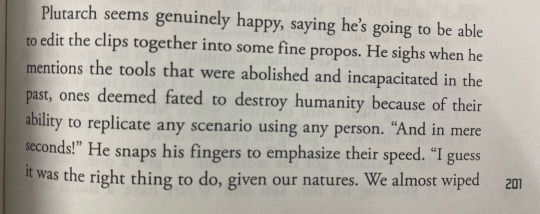

#thg sotr#sotr#sunrise on the reaping#can you tell i’m suspended from college and miss writing essays#sotr ai
20 notes
·
View notes
Text
I’m gonna talk some more because I really want to talk Psychonauts instead of doing meaningful work.
Why is it always when I’m not crunched for time that I can’t think of ideas? I find myself setting arbitrary time constraints for myself and instead of being productive with them I’m just panicking over whether or not I can complete a relatively simple task WELL in a time limit I set for myself.
And now, while you’re piecing together how the hell task-based anxiety relates to Psychonauts, I throw Compton Boole at you like a bowling ball.

STRIKE! Or, Spare? I don’t bowl often.
We all have a little Compton Boole in our heads, I think. Someone who lightly taps your cheek whenever you’re having a rest and reminds you that there are better things you could be doing with your time. Some people can just manage their little Compton better than others.
No shame in it, it’s not like you can control crippling anxiety. That’s your chemical imbalance and therefore your business. I was just putting myself on the spot because it’s more ✨ethically responsible✨.
Given that anxiety is primarily a fear disorder, it’s unsurprising that most studies on it are run on animal models —which is elaborated on in a 2009 research paper on neuro-circuitry of fear and stress disorders by Drs. Shin and Liberzon. Obviously, much more has been discovered since, seeing as sixteen years is a long time for developments. Regardless, this is about the rats.
The main difference between rodents (and most animals) and humans is that humans have a tendency to have fear responses to things that aren’t clear, unconditioned stimuli— as well as phenomena such as anticipatory anxiety, which is evidence (one piece of many) that animal models aren’t all that accurate in human study.
In other words: humans react anxiously to stimuli that (and I am not attempting to reduce the impact of anxiety, because it is very real) does not exist.
Here I raise you the Compton Boole-shaped bowling ball that I just threw at you.
Any of this sound familiar?
Compton is anxious, and we see that from the get-go. The way he speaks has a quavering quality to it, his voice seems to crack every other sentence. We learn what he’s anxious about, and it’s quite literally all in his head, and self-imposed on top of it.
Ram It Down is a prime example of setting oneself up to be anxious, even unwittingly. Compton has put himself in an environment that is:
1.) “Broadcasted, Timed, and Judged”, as it’s on TV. This is an environment in which judgment is not only expected, but encouraged. Tell me you haven’t watched a competitive cooking show and not judged a contestant for one thing or another. It’s not even a conscious effort, half the time. We even go so far as to face off against the entity: judgment. Not to mention the Actual Cooking Show Judges that are present and consistently heckling us. It’s clear that Compton fears judgment— he says it himself!
Also— the time limits. Nothing bad happens when you don’t complete the dish within the time limit. You can take your time, it’s fine. Again, with the arbitrary time limits he sets for himself when the task isn’t actually requiring a time crunch.
2.) The goats. In some contexts, goats mean creativity, and drawing back to Hinduism— the transformative powers of fire. Both of which seem to fit with Compton’s love of cooking.
However, there’s also the negative meanings. The obvious— relating to or of the Devil… though we don’t particularly see any religious references in the game or in Compton specifically. Another negative meaning that I feel has more prevalence is the concept of the scapegoat, in which a goat is burdened with sins and outcasted… perhaps, to a psycho-isolation chamber.
But a more likely and probable cause for the goats is that goats are rumored to eat anything, even things that are realistically inedible. While this isn’t necessarily true— I have experience with goats that prove that they’re rather picky— it’s still a way for Compton to put himself down, or perhaps give himself some hope. ‘They’ll eat anything’ in a positive connotation vs. ‘They’ll eat anything’ bemoaning his situation.
3.) It’s taking a lot of the joy out of something he finds comfort in; cooking! Cooking is —from what I researched, at least. Correct me if I’m wrong— the less precise of the culinary arts, focusing more on flavor than the chemical reactions necessary to make baking work. Cooking shows and baking shows, at least to me, seem like they bring a lot of joy to the art, where I get to see how people from different backgrounds and contexts get creative with their food.
But not everyone wants to be on television. Not everyone wants to cook outside of their home kitchen, with the tools and ingredients they’re familiar with. Not everyone wants to be put on the spot, have their methods and ideas harshly judged by people you don’t know, and to seem so small in comparison to some hot-shot public chef’s giant ego… in a literal sense, for Compton.
All in all, this guy set himself up for anxiety and stress without even thinking of it. He’s coming in expecting failure, and some meddling kid goes and proves to him that he’s significantly more competent than he thinks, and that his friends love him dearly (and all blame themselves for their group’s collective shortcoming. Except Otto. Because Otto’s well adjusted).
Which means that if you feel too anxious to function, sometimes all it takes is a little help from someone you hardly know, and trusting them to help you work through it :]!
I don’t know when this turned into life advice, because I’m not a qualified therapist. I’m just a college kid who likes to write about psychology and see all of the cool studies that people have run solely in the interest of helping their loved ones and people around them. I feel like Compton Boole is a love letter from the Psychonauts Devs that reads: ‘if he can do it, so can you.’ I feel like the whole game echoes that in almost every aspect.
That got surprisingly deep. I have no important exams this week, so I’m getting anxious over nothing until I have something substantial to worry about. But for now? We can let ourselves relax. I implore whoever is reading this, also, to go relax.
#oil rig rants#god i love this game#psychonauts 2#psychonauts#compton boole#I’m surprised I didn’t mention Cassie at all in this!#I LOVE Cassie!!!#she’ll get her own post#maybe#again#well of ideas#it isn’t well-ing#I also think it’s rather interesting that they chose cooking for someone like compton. like in hindsight it’s totally fitting but#you don’t get the impression he’s a chef until you talk to him more#I guess it’s just his way of showing that he cares. what’s more caring than a home-cooked meal?#I researched rodent testing in fear based disorders for this and yet I couldn’t be arsed to look up bowling terminology
20 notes
·
View notes
Text
The Voltaire-Rousseau Beef aka V v. JJ part III.
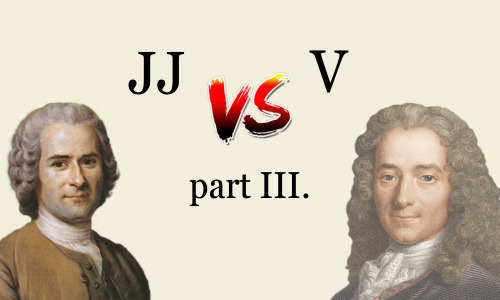
for @stars-in-the-night , @headsinsand and other great (and amazingly patient) readers
part 1 ; part 2 ; part 3 ; part 4
7. THE ORPHANAGE (to be read in Eliza Hamilton's voice)
The one thing from his personal life that Rousseau is probably best remembered for is the fact that he gave up all five children he had with his long-term partner, Thérèse, to a Parisian orphanage. One after the other, in what could be called a rapid succession, a simple case of salut and adieu.
The reasons he gave for his behaviour differ from ‘I have fallen with a bad crowd in Paris and this is just what people around me did’ and ‘I basically had no other option anyway’ (not true, he could have married Thérèse and try to make it work. Sure, money was tight, and someone could make a few snarky remarks about the first baby looking surprisingly big for a six-month old or whatever, but these things happened quite regularly. Also, Diderot married his working-class mistress despite his father’s stern disapproval. Just saying) to – now this comes up somewhat later in the Confessions and is significantly darker – ‘I really hated Thérèse’s family and thought it would be better to let my kids be raised by the state than be around them’.
If this was him trying to break a cycle of generational trauma though – perhaps one of the side of his own family as well – I’d argue there were far better ways of going about it. There’s also potentially one even darker, quasi-psychoanalytical reason for this now infamous choice, but it’s probably best to steer clear of Freud. Nothing good usually comes out of it.

Of course, doing something like this would make anyone seem like a douchebag, but a guy famous for writing a treatise on how to best raise children?* Guy who repeatedly argued that the single purpose of a woman’s life is to be a mother? Now that’s a hypocrisy so deliciously juicy that one simply cannot resist sharing it with the world!
*interestingly enough, he insists in the Confessions that he wanted to reveal this information in his On Education (aka Emile), and that in one of the book's passages, he alluded to this episode in such a way that he ‘basically confessed to it already’. I haven’t found that part yet, and I remain somewhat sceptical about whether this is truly the case.
8. SECOND INTERMEZZO: VOLTAIRE THE AVID HATE-READER
V on Julie, or the New Heloise: „silly, middle-class, dirty-minded and boring“
V on Profession of Faith of a Savoyard Vicar: „I read his On Education. These are reasonings of a stupid nurse in four volumes, of which forty pages directed against Christianity. They are among the most daring that have ever been written, [but] by virtue of inconsistency worthy of this head without a brain and this Diogenes* with no heart, he uttered as much abuse against the philosophers, as against Jesus Christ.“ (letter to Damilaville, 1762)

*calling JJ ‘Diogenes’ was definitely a trend in the 1700s, and what seems like V’s go-to insult for him. Calling him a ‘lackey of Diogenes’ does potentially get a bit kink-shame-y though...
9. A MOUNTAIN AND AN AVALENCHE
The last post featured an earthquake in Portugal, now get ready for a distinctly Swiss natural disaster!
To be perfectly fair to Voltaire, although he was certainly not a person who was above spreading gossip, he did have a good reason to publish what he knew about Rousseau and let all hell break loose, since...
in Rousseau’s Letters Written from the Mountain published in 1763, JJ had exposed Voltaire as the author of the infamous Sermon of the Fifty, an anti-christian work that had the potential to get its author into serious trouble. Voltaire could not and would not let this slide – especially when he had the perfect weapon on his hands. Payback time!

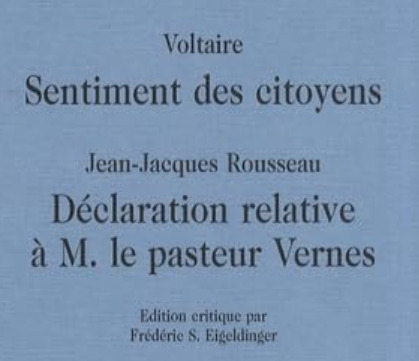
Voltaire therefore went on to publish a short anonymous pamphlet titled Sentiments des Citoyens (aka How Citizens Feel – since JJ proudly called himself ‘citizen of Geneva’ in his works and he championed sentiments over reason – see, it’s all very clever!) in which he exposed details from Rousseau’s personal life. This of course included the most shocking, most hypocritical, and most memorable detail of all: Rousseau, Mr. Family First, Mr. Let’s-raise-precious-children-in-a-way-that-won’t-corrupt-their-natural-godness had dumped all of his offspring into a Parisian orphanage! Not so virtuous now, is it?
Interestingly, Rousseau never put two and two together and realised Voltaire was the real author of the fateful pamphlet. It would be interesting to see how he would react had he known.
That said, much like d’Alembert’s article on Geneva a couple of years earlier, the Sentiments des Citoyens led JJ to pick up a pen once again to do what he did best: to defend the poorest and most oppressed souls against the cruel and unjust world. Which usually just happened to be himself.
And thus, as Roger Pearson, an author of one of Voltaire's many biographies concludes:
“we have Voltaire to thank for (…) being the catalyst of Rousseau’s Confessions” which he calls “one of the world’s great autobiographies”
(no, not like that @chaotic-history. Though now I cannot unsee it every time I read the quote)
->
Tune in next time for the (mis)adventure in Britain which will feature:
another philosopher - David Hume - dragged into the mess
a fake letter from Frederick the Great (that was actually penned by the most messy gossip of a person in the 18th century)
a genuinely funny statue story with an appearance from d'Alembert
#voltaire#rousseau#long post#essay#jean jacques rousseau#tw: jj#philosophy#history#french history#18th century#1700s#age of enlightenment#v#thanks for everyone's patience! part four is just a day or two of reading + writing away#enlightenment#18th century drama#french philosophy
75 notes
·
View notes
Text
Maybe some one smarter than me already said this, but I think Tobias is following the way of Revelations in how the new Pope's era will unfold.
*Disclaimer: because I wasn't part of the Ghost fandom between Papas 1-3, and I haven't seen RHRN or much or the YouTube clips, take this with a grain of salt. Also if someone else already said/analyzed this, let me know.
*Also the Biblical quotes below come from the King James Bible, whether that's not accurate enough im sorry but idrc, I just needed things to make my point.*
Therefore, this only focuses on Copia and Perpetua as an outsider with limited knowledge on Catholic religion and whatever the hell Ghost has going on.
This is not meant to be taken seriously. Everything in this post is opinion and not factual. This is also not proofread or edited.
Ok, so Copia's themes. When he was a Cardinal, he emphasized disease ("Rats"), and the Plague specifically, as with the title "Dance Macabre."
For those who don't know, the original idea of Danse Macabre is an allegory of death (or personification of it), and the universality of death, much like a Momento Mori: it comes for everyone, king and peasant alike.
Danse Macabre was very popular during the Late Middle Ages. Wonder why? The Bubonic Plague, The Black Death was making its rounds throughout Europe. Anyone who was anyone - and nobodies, too - were dying from the Plague. Now, we look at the title of this album Prequelle (translation: Prequel.)
This obviously hits the mark on two things: the prequel to Copia's ascension to Papacy, and the Prequel to his second albulm (first as Papa), IMPERA.
IMPERA thematically represents the "Rise and fall of empires." This can literally mean what it says, but it can also mean death, too. Empires, much like people, also must remember Momento Mori: that they, too, will also die or "fall"; nothing is meant to last forever. And the people living in these empires experience death as well, whether that be figuratively (their homeland falling into ruin) and literally, as in genocides via war, lack of resources to support the populations of empires or - and stay with me in this - diseases wiping out entire empires.
How does Revelations fit with Copia? Easily we can say he embodies two of the riders of the Apocalypse: Plague (the first horse, originally known as Conquest but was changed over time), and as Death. Why? The beautiful song "Witch Image" (Prequelle album) with the lyric of him being on a pale white horse - Death.
Well, let's look at Revelations 6:7-9 "And now I saw a pale horse, and its rider’s name was Death. And there followed after him another horse whose rider’s name was Hell. They were given control of one-fourth of the earth, to kill with war and famine and disease and wild animals."
Copia fits Plague well for obvious reasons, but we can also fit him in as war/conquest as he, iirc, did kind of overthrow Papa Nihil and his brothers via killing them and becoming Papa IV; killing and overthrowing has historically been viewed as acts of war, so there's that for the bolded statement above. The wild animals part? Hunter's Moon because someone on this site said it was the perfect werewolf song and now it's all I can see when I hear that banger lol.
Anyway, where does Perpetua fit in all of this? Well. As a casual onlooker, all you ever hear about the Apocalypse are the four broken seals and the four riders of the Apocalypse. You never hear about the fifth one in Revelations 6:9-10.
"And when he broke open the fifth seal, I saw an altar, and underneath it all the souls of those who had been martyred for preaching the Word of God and for being faithful in their witnessing. 10 They called loudly to the Lord and said, “O Sovereign Lord, holy and true, how long will it be before you judge the people of the earth for what they’ve done to us? When will you avenge our blood against those living on the earth?”
I've heard this particular Revelations passage being called, "The Cry of the Martyrs." This relates to Perpetua because many people - or Tobias, I can't figure out who said what or if it's just a fan theory - say this newest Album, SKELETA will focus more on saints and Martyrs and martyrdoms.
Here are now my connections: Papa V Perpetua is the fifth Pope, which shallowly connects him to the fifth seal. The fifth seal in Revelations specifically calls back to everyone who died from the previous broken seal, Seal 4 with Death and Hell following close behind. Those who died in the fifth seal want revenge on those still dwelling on earth.
People have pointed out Papa V Perpetua embodies the other Papa's through the designs in his Papal robe/costume. So that means he's representing or symbolizing the other Papas, who could be defined as Martyrs for "They died preaching the word of (Satan) and being faithful in their witnessing."
Is that why he has a skeleton design? Yes. He is representing the dead. So did all the Papas with their skeleton makeup, right? In a way, yes. But this Papa V is different. Why?
Papa V Perpetua takes on the look of a skeleton. Is he a Momento Mori, death personified? But who for? Copia's MOMENTO MORI personified!!
I think that's why a lot of people are rightly theorizing/predicting a deep connection between Copia and Papa V Perpetua, because there definitely is one.
However, I see the connection through the lenses of Revelations and previous albums: Copia is the rise and glory days of his empire, from being Cardinal to Papa IV to now IF; he's the one who overthrew established tradition and killed his kinsmen, the horseman of conquest/war but mostly disease and death. Perpetua that we've seen so far is the fall of Copia's empire, the phase that comes next in the lifecycle, the revenge of the martyrs, Momento Mori personified.
Anyway, in this post I plan to - jk. Hope those who read this enjoy and engage, I'd love to see everyone else's ideas about the new Ghost era and Papa V Perpetua!
#ghost the band#the band ghost#ghost b.c.#papa v perpetua#cardinal copia#copia emeritus#papa emeritus iv#papa perpetua#ghost band headcanons#ghost band hc#ghost band theory
20 notes
·
View notes
Text
How are we meant to look at operas, anyway? (and what are they?)
Operas are my favorite art form of them all. This is because I think they are "just really neato" and "the most interesting to study". However, if you were to go around and ask what Defines an opera? Nobody would have a concrete and true answer to the question. They aren’t ‘sung through stage works’ because many operas aren’t sung through and non-operas that are. They have no specific orchestra or singing requirements. Even determining them on a cultural basis doesn’t entirely fit. I actually think ‘art’ is too loose and philosophical a term for what they are either. (I mean, yes, they are art. But how are they so?)
I think that while there’s no concrete definition for what an opera actually is, there ARE certain sets of… rules (for lack of a better word) that dictate how operas Are and what we should do when Seeing them. Funnily enough, the most complete rules I’ve seen for operas I found in an essay that has nothing to do with operas at all- “Monster Culture: Seven Theses” by Jeffrey Jerome Cohen. My rules for How To Look At Operas are heavily derived from that essay, interpreted in ways to best fit the art form.
My Rules of Opera (with apologies to Mr. Cohen):
1. The Opera’s Body is a Cultural Body.

Operas are sociological and anthropological records that entail a gap in time between their composition and their performance. They contain as many perspectives as there are people aware of them. Every time you watch an opera, you are negotiating with something or someone else. And these records are always being added onto- no opera is ever truly ‘complete’.
Operas cannot truly be escapist entertainment because they directly reflect societal problems in both the composer’s time and ours. La Traviata’s main conflict- the way sex workers are demonized and unsupported among ‘polite society’ and how societal expectations and the pressure to conform destroys lives- is something that existed in Verdi’s time, and our own. La Traviata is about the sex workers of today who can’t find work anywhere. It is also about how Giuseppe Verdi’s wife was poorly-treated by the people around her for having been sexually active before their marriage. It is also about the gap between these two events, and how one thing became (or still is) another.
An opera production is not a recreation. No matter how ‘original production accurate’ they claim to be, they are always a negotiation. There is no such thing as accuracy, as civic law. Once one is freed of the expectation of ‘canon’ or ‘what ought to be’ in an opera, one can deal with these creatures more handily.
2. The Opera Always Escapes.

No matter how many times Don Giovanni is dragged off to hell at the end of Mozart’s opera of the same name, he always reappears again in a fresh new staging. He never stays down there. Maybe the gates to Hell are looser than we imagine- or, more likely, this is because he represents something that cannot be defeated. What does the character represent? Abuse, sexual violence, power (with class, with gender, with religion); grief, loss, death. None of these things will go away in our lifetimes or the next, and so Don Giovanni as an opera remains relevant.
In fact, there are no ‘irrelevant’ operas in the standard canon as we know them. Any irrelevant operas that did exist are long gone because there would be no reason to revive them. Even operas that have ‘aged poorly’, like Turandot, confront us with why they’ve poorly aged and force us to reckon with some part of our current world. We react to them in some way and therefore they are worth further looking into.
I call this the “All Dogs go to Heaven” theorem because it doesn’t argue that all operas adhere to the same standard of quality, or are even written with good intentions in mind- but it does argue that they all are worth studying and experiencing. And any opera, as long as a copy of its score and libretto exists, can come back from the dead. So just like the movie, not all of them stay there.
3. The Opera is the Harbinger of Category Crisis.

One of the most common ways to explain away what an opera is, against a musical or a straight play, is to claim that operas are sung through while musicals feature spoken dialogue. Respectfully, this is wrong and insane. Two of the most famous operas of all- Carmen and The Magic Flute- feature extensive spoken dialogue, while Hamilton and Cats (both sung through) are musicals. The notion of operas having specific orchestral or voice requirements isn’t quite true, either- each era of opera, and each opera, is a separate animal.
Is Porgy and Bess an opera, or is it a musical? It features many musical qualities with the latter, and was written by musical-writers - yet it is referred to as an opera. Sometimes it is both. Maybe at some point it could also be neither. Operas do not participate in the general categorization of their Western theatrical siblings. Musical, straight play, ballet- these art forms are immediately distinguishable as themselves. (Note that musicals, despite having a lot of variety, do not have as wild a diversity as operas do owing to their relative youth as an artform.) But an opera can be all three of these and still be an opera. Not only that but there’s so many ways for operas to be- chamber opera, verismo, singspiel, music drama, opera-in-jazz. The opera may borrow from any art, at any time. Its incorporeal form grants it the ability to shift. This is both opera’s great weakness and its greatest boon of all, maybe its most defining operative feature of them all- it can be anything you want it to be.
4. The Opera Dwells at the Gates of Difference.

With their characteristic exaggeration and other oddities, operas are immediately recognized as depicting a world that isn’t quite our own. It’s a world rooted in our own (see point 1) but it isn’t our world. We don’t sing, or gesticulate to that degree, or stab people at the drop of a hat to solve a problem. As much as opera tries to be ‘like us’, it never is entirely so, in a sort of Frankenstein way.
In this way it is no wonder that all operas focus around difference- from each other, from society, from ourselves. Sometimes this difference is explicit- the ‘othered’, shunned main characters characteristic of the Verdi operas, as in Rigoletto and La Forza del Destino- and sometimes it is more implicit (Tamino and Calaf being strangers to the people around them, Figaro’s position of a lowly barber among Counts and Dons, even Orpheus out of place in the Underworld). The opera seeks to represent the Other. Oftentimes the opera itself is the other. We are all made to learn a new set of social rules when we come to the opera- this equalizes us as an audience, and paradoxically renders us the Other. Opera is about othering and being othered. This is not necessarily good, or bad- it is just a neutral feature.
5. The Opera Polices the Borders of the Possible.

Every opera begins with- and then revolves around- some kind of transgression. Moral (Don Giovanni slays the Commendatore), cultural (Pinkerton marries Cio-Cio San), societal (Alfredo falls for the courtesan Violetta). The way the opera’s narrative body reacts to this transgression is what will come to define that opera’s theme and what it stands for. Even in the most comic operas, the inciting incident is always a transgression; it is up to the interpreter to detect what the transgression actually is, and from this point the opera emerges all at once like a cracked egg.
Die Meistersinger Von Nurnberg is an interesting case study in transgression. The initial transgression may be seen as Walther joining the Meistersinger contest to win the hand of Eva- he is, after all, not initially a singer, and an intruder on the world of the (educated, cliquey) Meistersingers. But this is not true. Walther initially disrupts status quo when he boldly joins them but he doesn’t stay that way- he is a literal knight in shining armor; masculine and chivalrous, the exact image of how men ‘ought’ to be. Beckmesser, the clerk of the Meistersingers, is consistently depicted as an Other, the nitwit among geniuses; he is effeminate and overconfident, we laugh at his attempts at music making. It is Beckmesser entering the contest himself as a competitor to Walther that is the true transgression in the opera, and the opera surmises this as a bad thing that must be punished through public humiliation and further exclusion. While there is no proof that Wagner wrote Beckmesser to be explicitly antisemitic, the character appears to subconsciously reflect many of Wagner’s antisemitic talking points, adding a particularly cruel underbelly to the way the opera sees the transgression of Beckmesser’s inclusion.
6. Fear of the Opera is Really a Kind of Desire.

Operas are marked by multiple features: Their otherness, their transgressions, their propensity to shift. These all give operas a certain other quality: They are a vehicle for catharsis. The fact that opera is so physically demanding adds to this- an opera is a workout in which emotions about a certain endless topic can be expressed. Salome is terrifying, but through her we can express rage and pure obsession that otherwise would have no place in society. This is also where the falsehood of opera as escapism takes root: When the opera is not given the space to threaten, its catharsis is cauterized into fantasy.
Opera is a space where we can play- already something rare in adulthood- and through the opera we are allowed to play with terror (something even rarer). It is an abstract liminal location only maybe rivaled by a rollercoaster, a playroom, or a shrink’s couch. This sheer radical expression of emotion makes it also easily-mocked by a popular culture unfamiliar with it. I suspect this is because, really deep down, operas are envied. They are so upfront, so passionate, so heartbreakingly sincere that they make those who laugh at art seem small, laughable. But the art form carries on, being unapologetically itself because it cannot be anything else.
7. The Opera Stands At The Threshold… of Becoming.

What Cohen writes here in the original essay is maybe my favorite paragraph about literary analysis ever written so I’m just going to leave it here in its entirety:

Why do we love opera? What are we meant to do with them, and why are they the way they are? We come to the opera to find ourselves. The rest is just postscript.
#opera tag#i wrote this in the middle of a rehearsal last week and then worried it was cringe. and then was like Ahhhhh fuckit#rambles#dramaturgy
66 notes
·
View notes